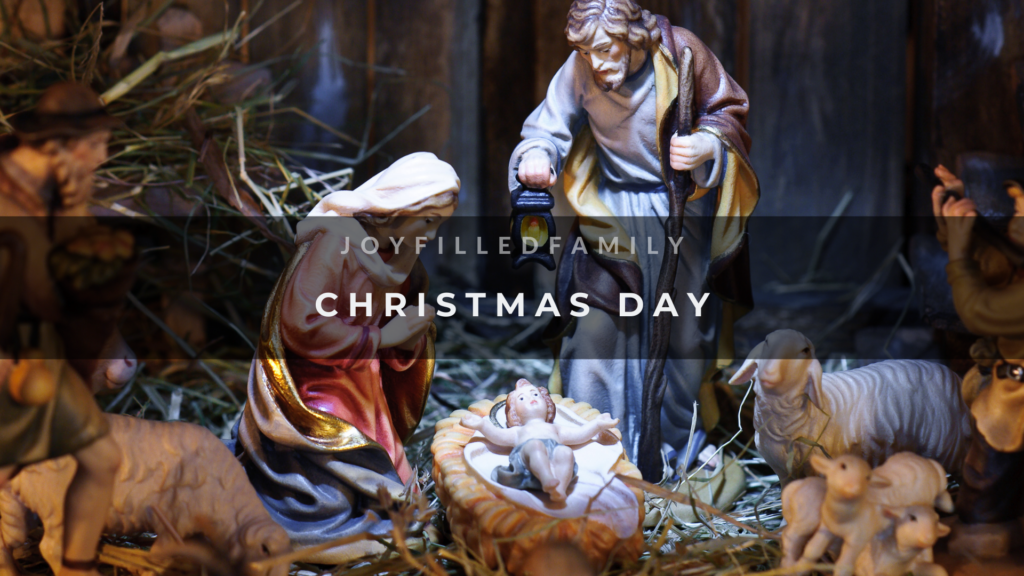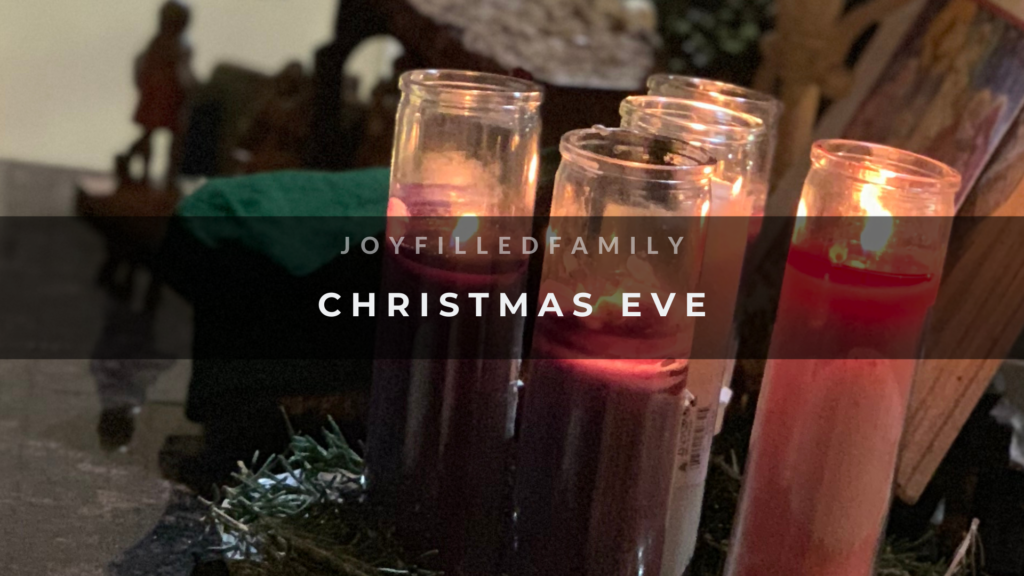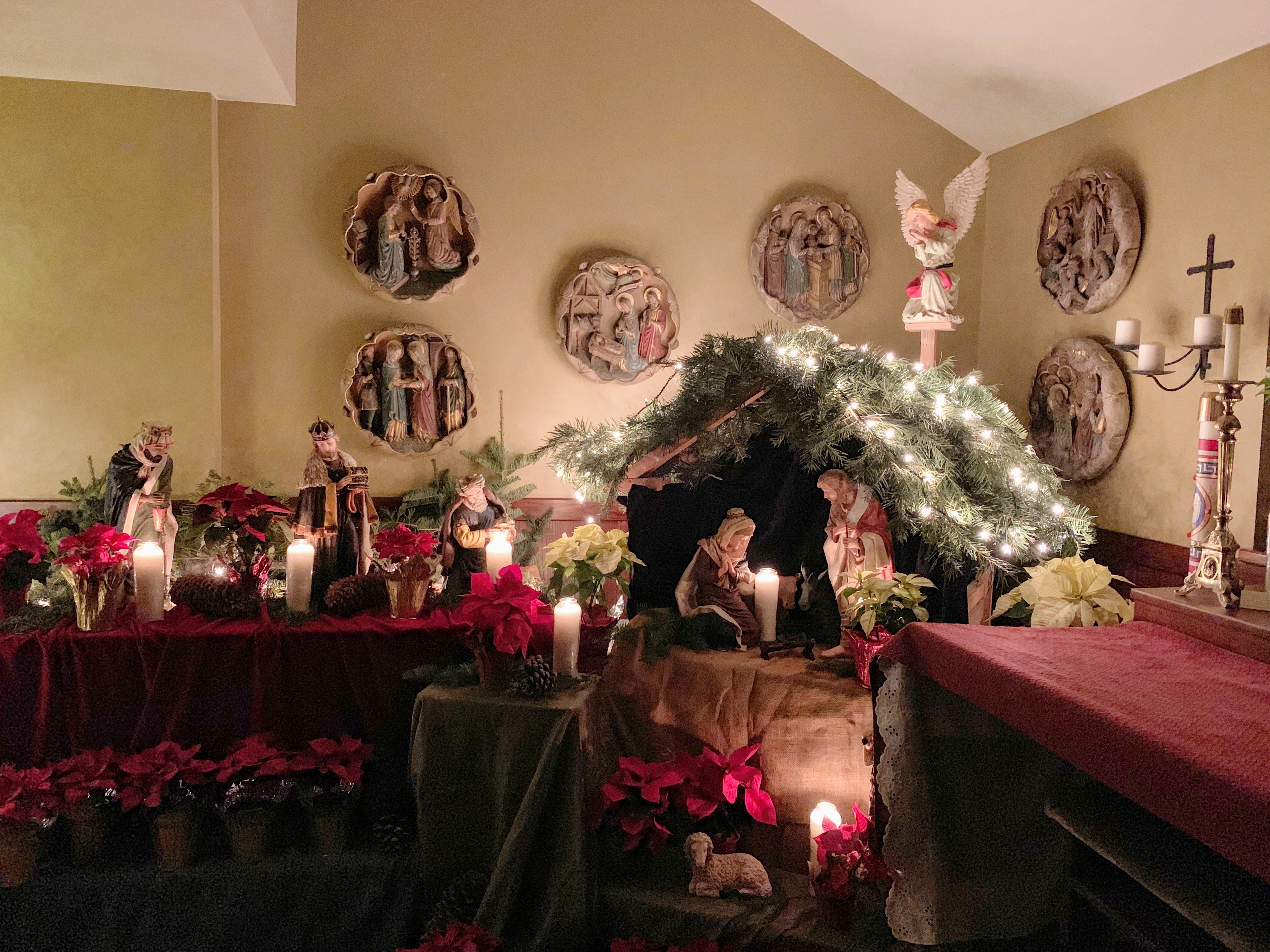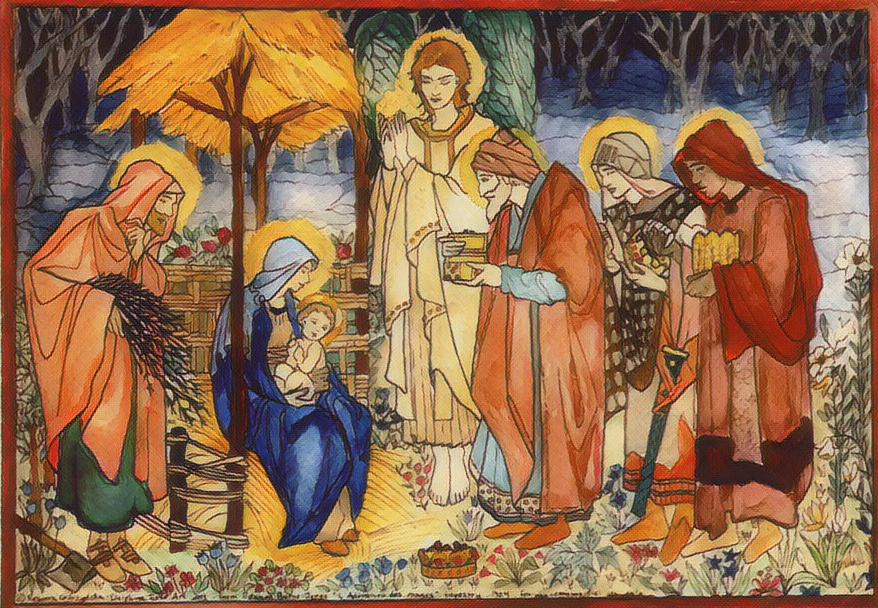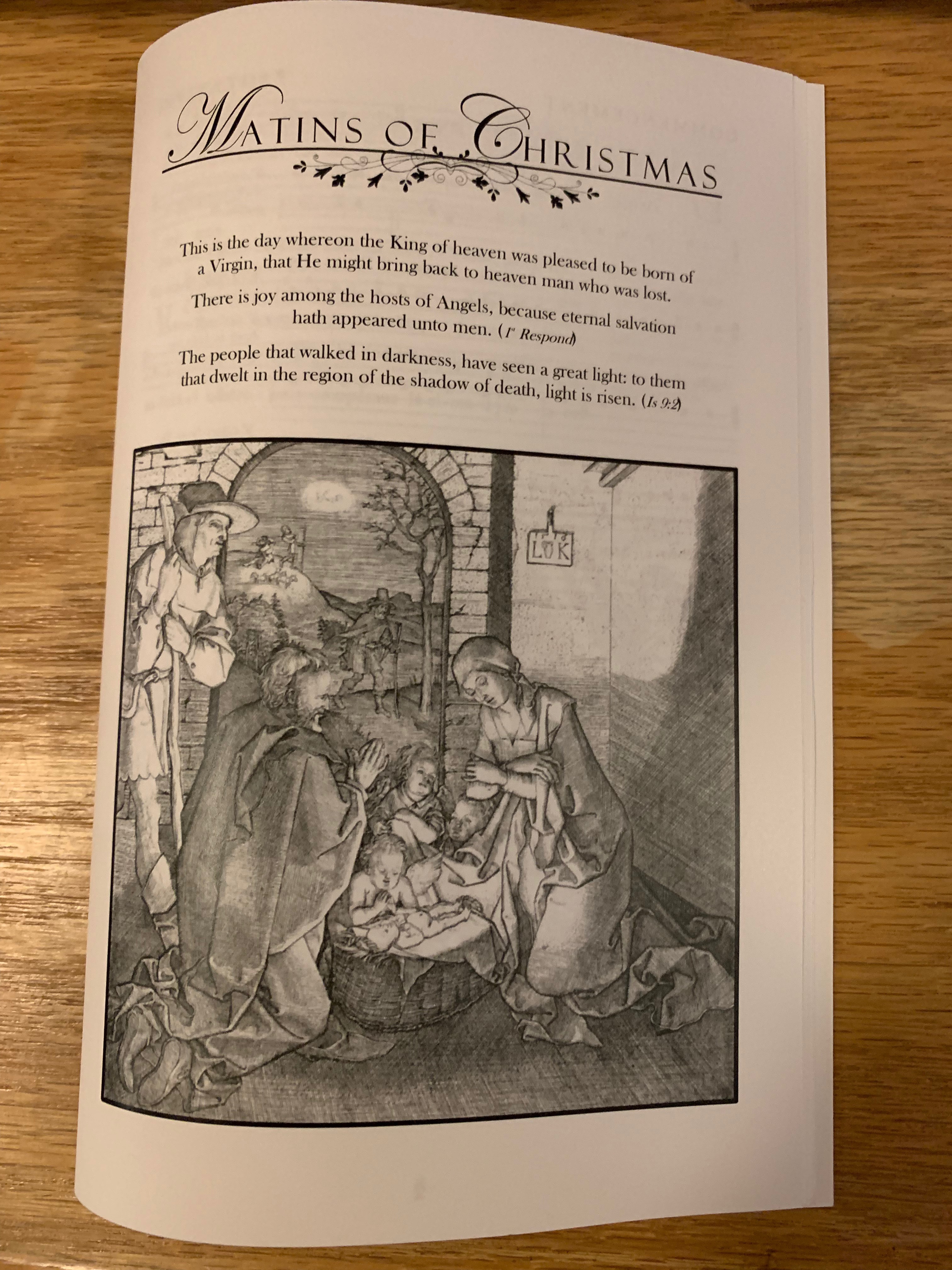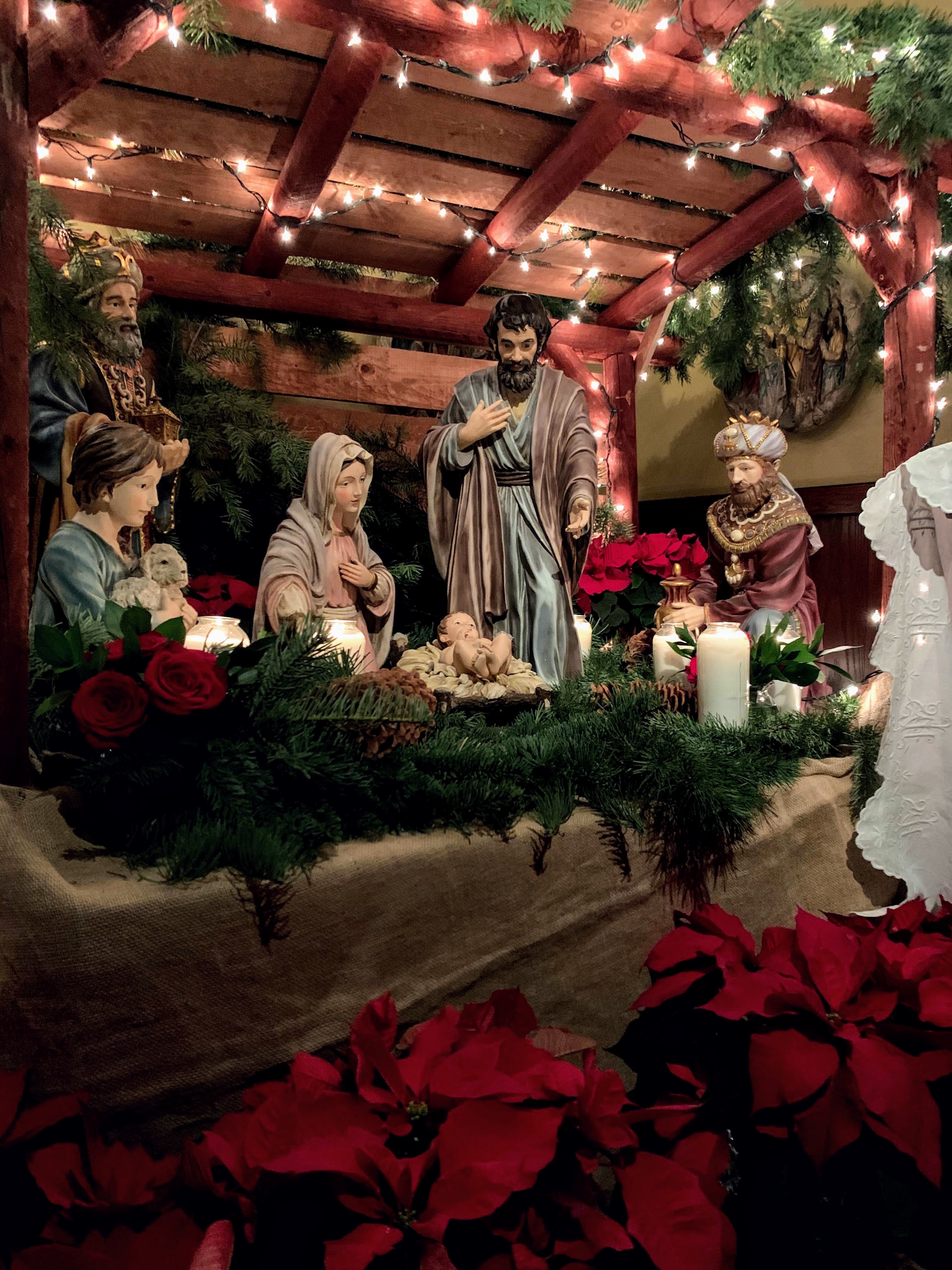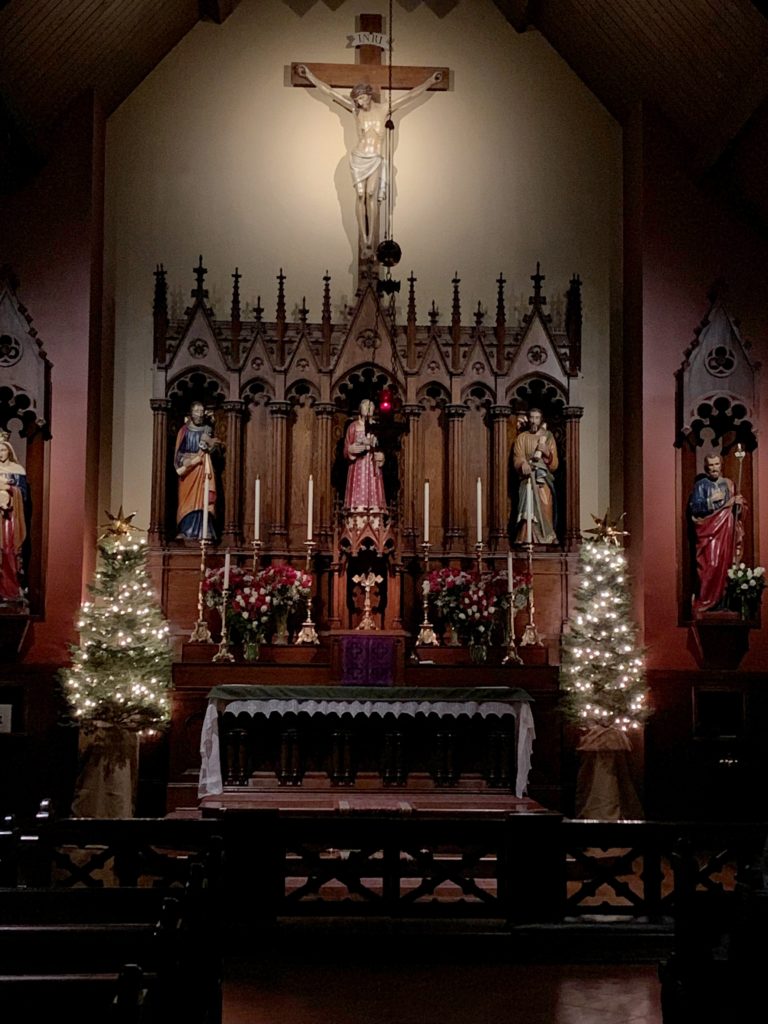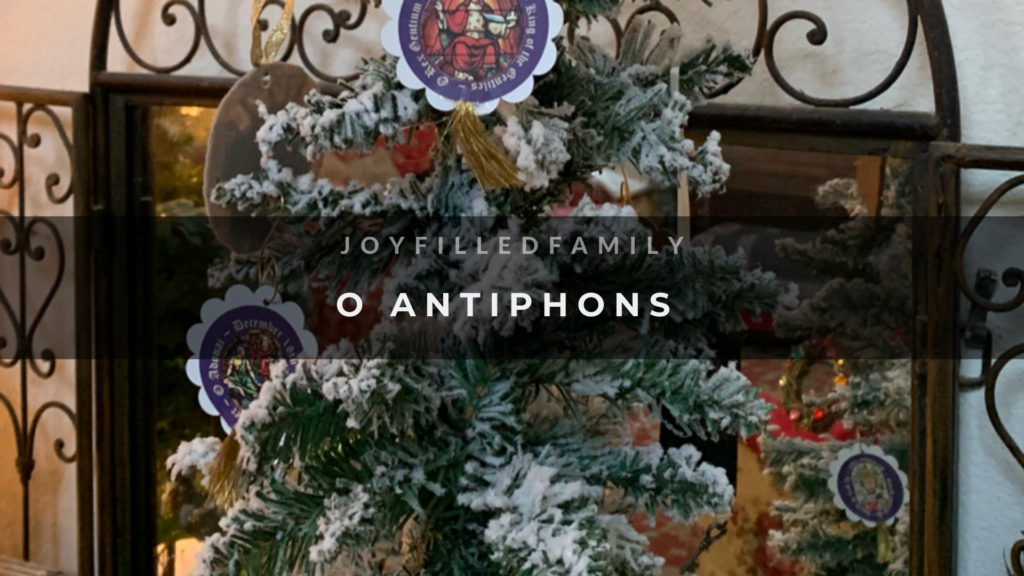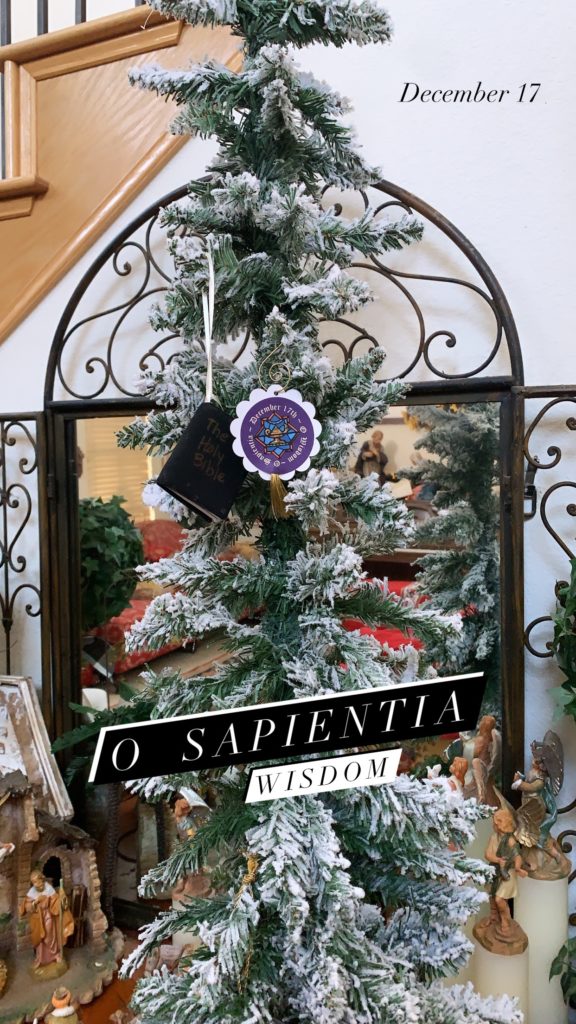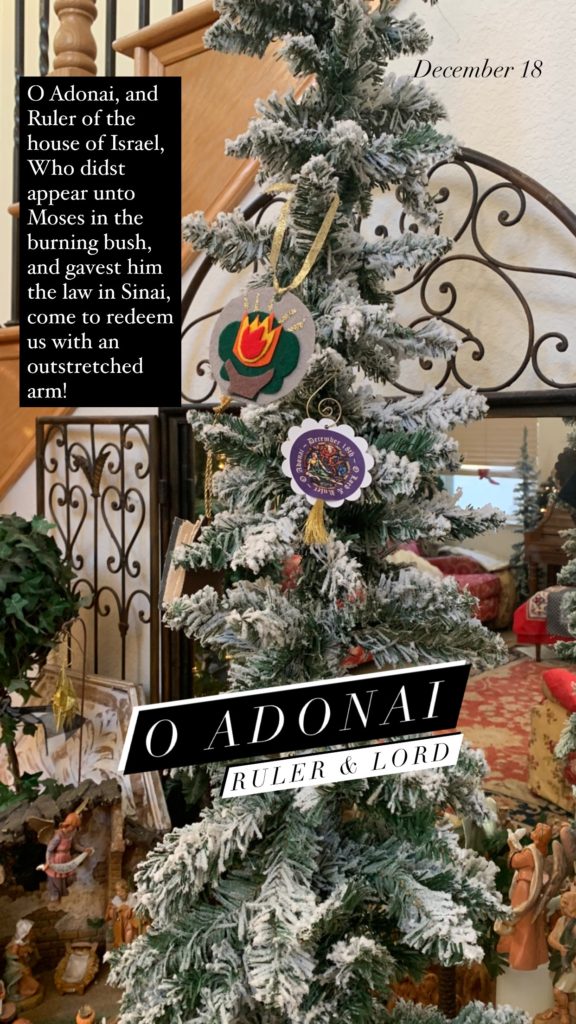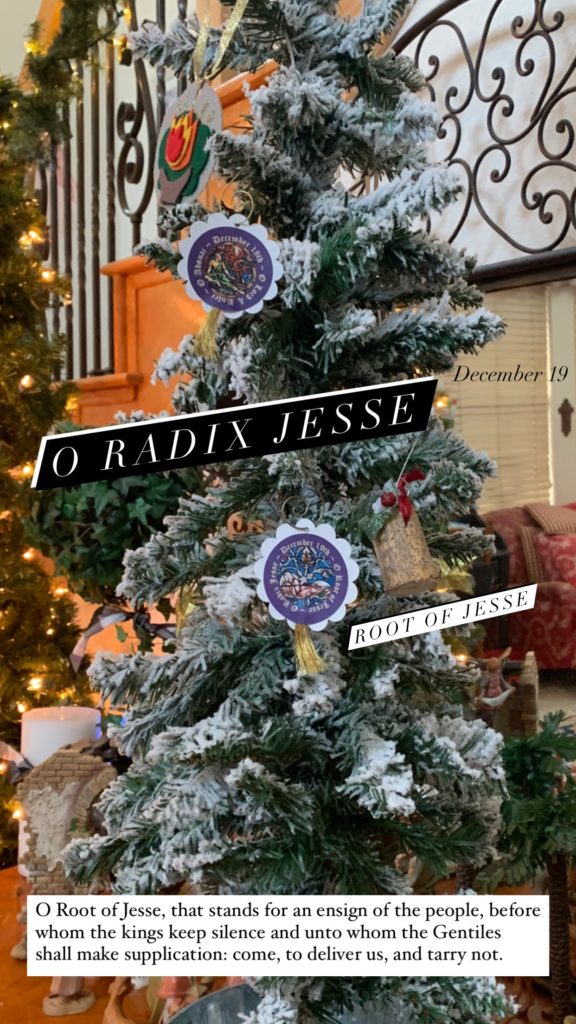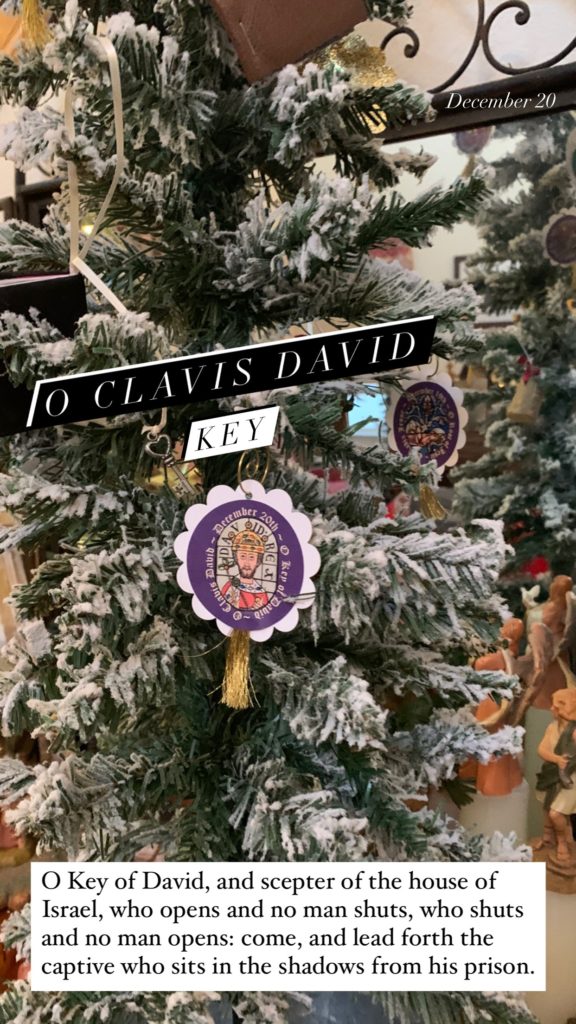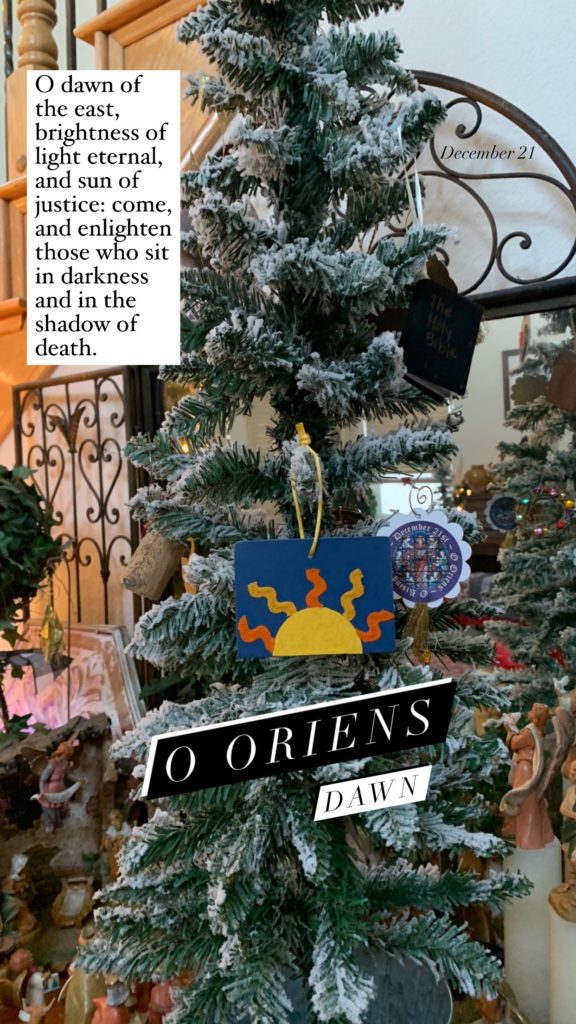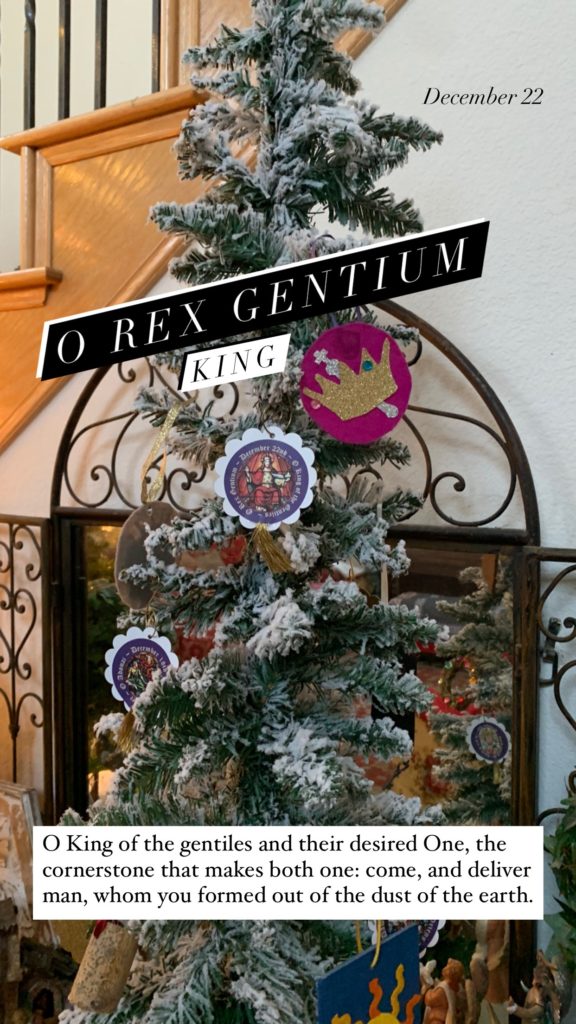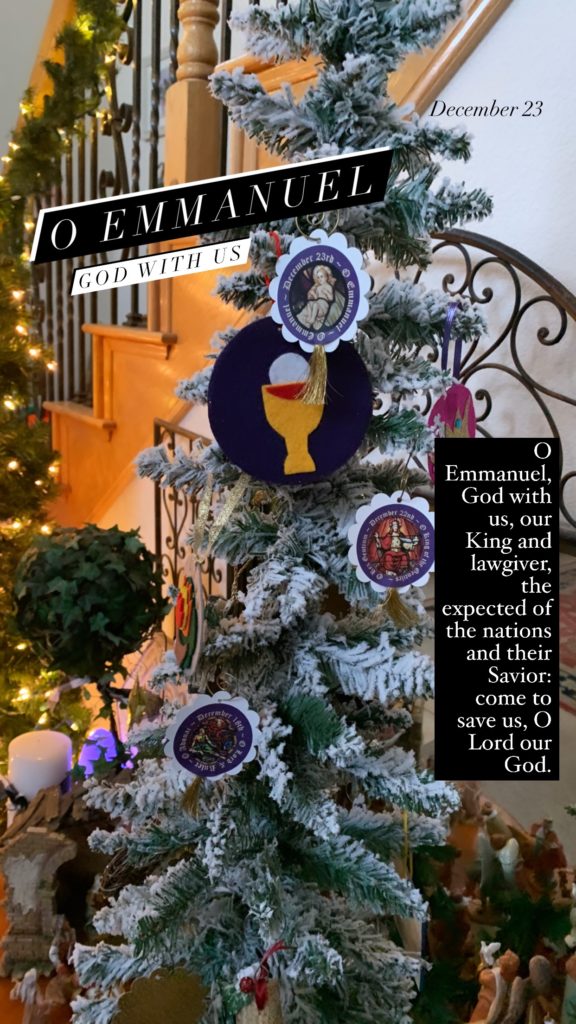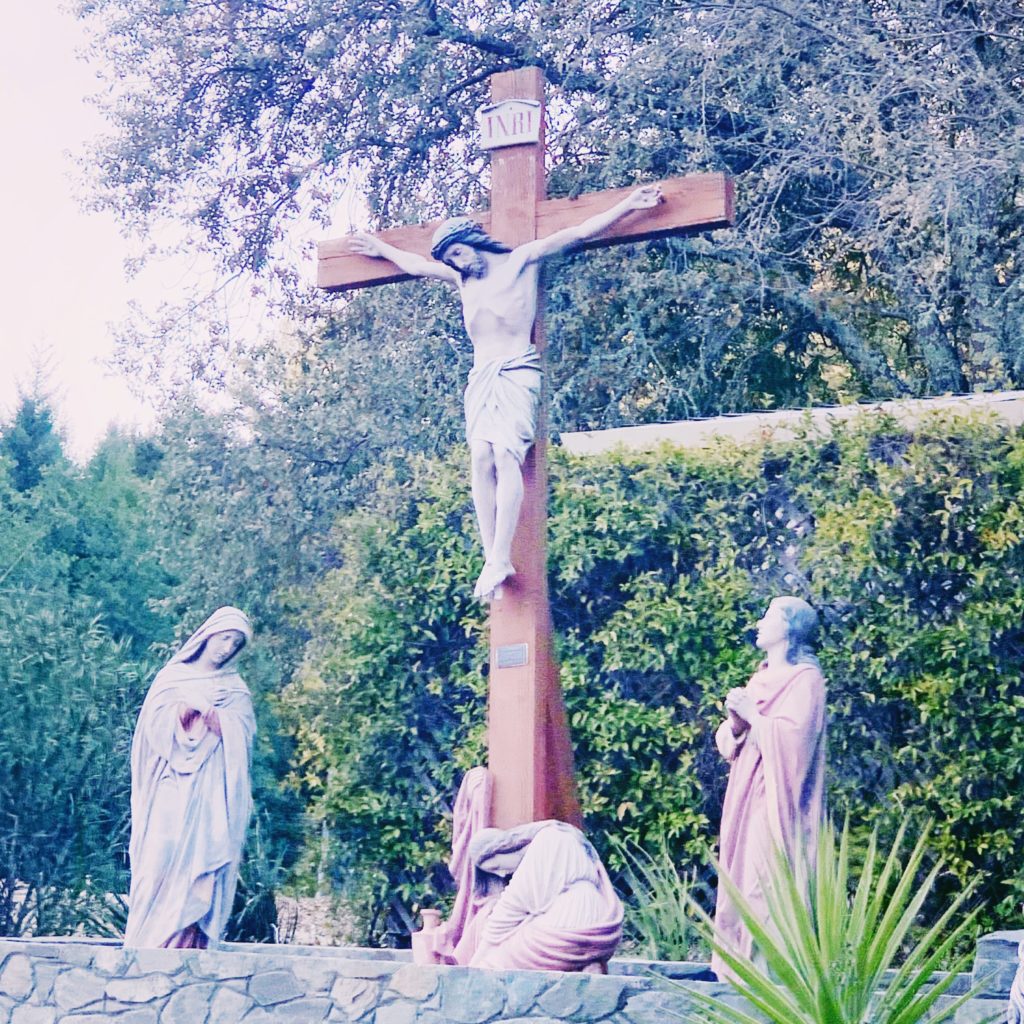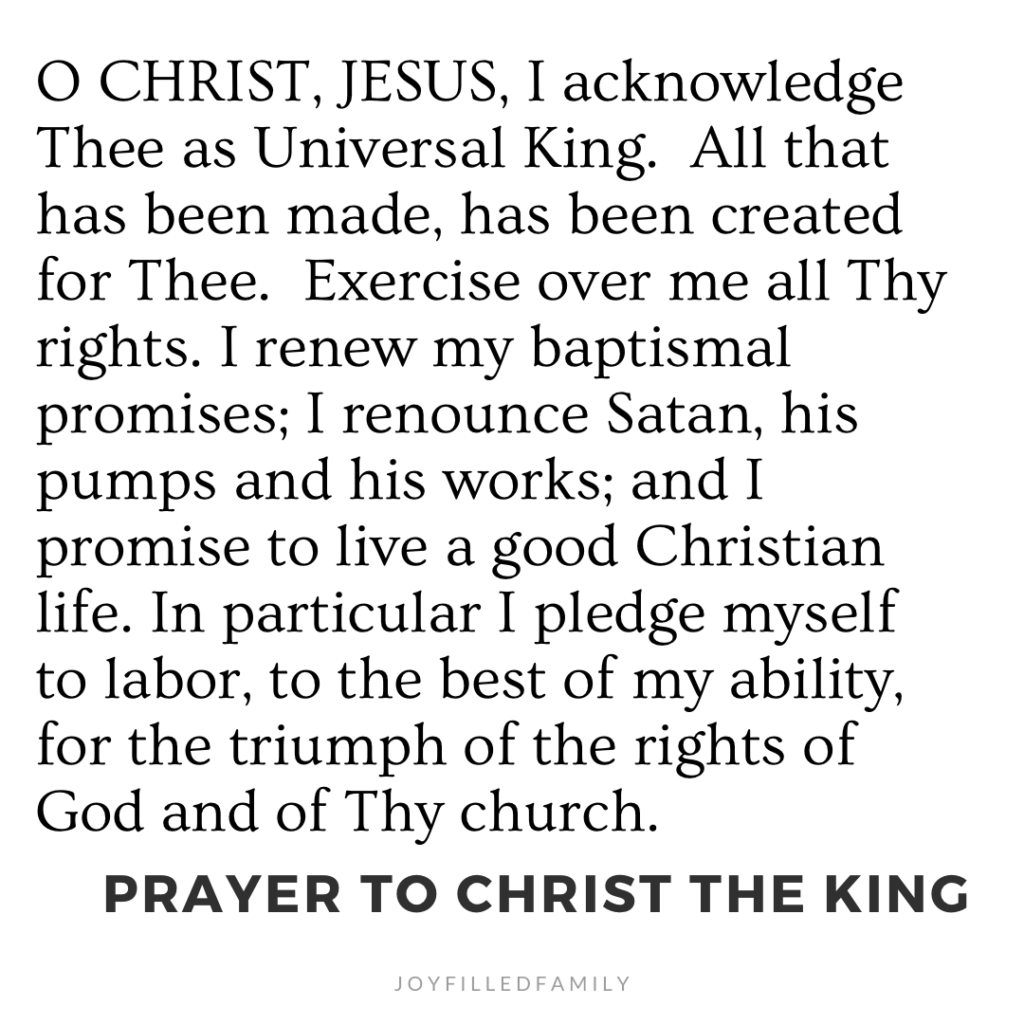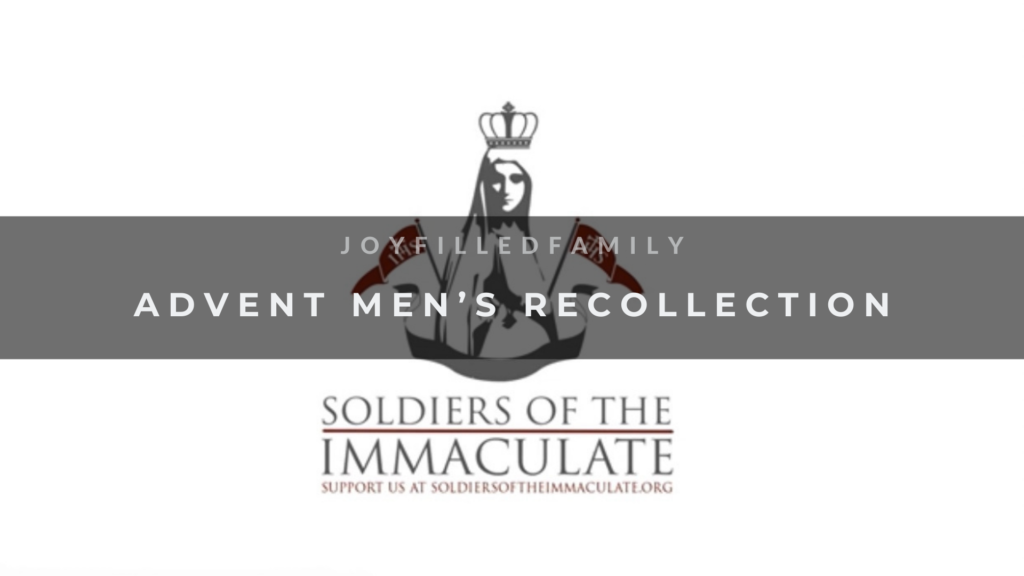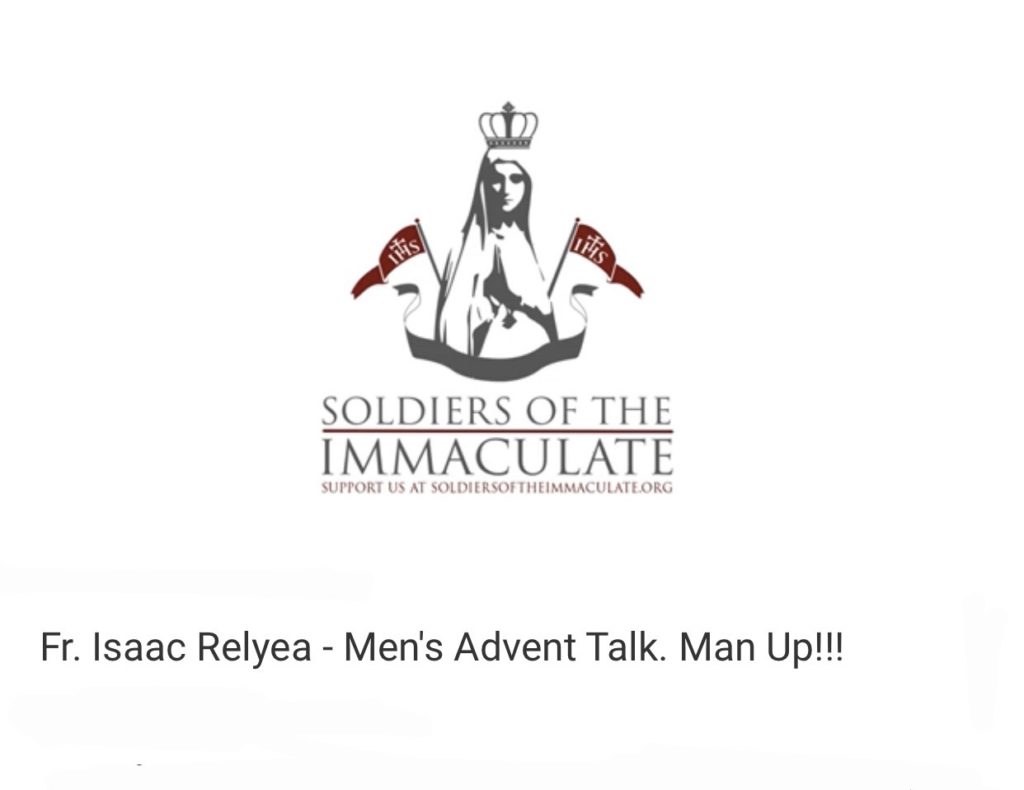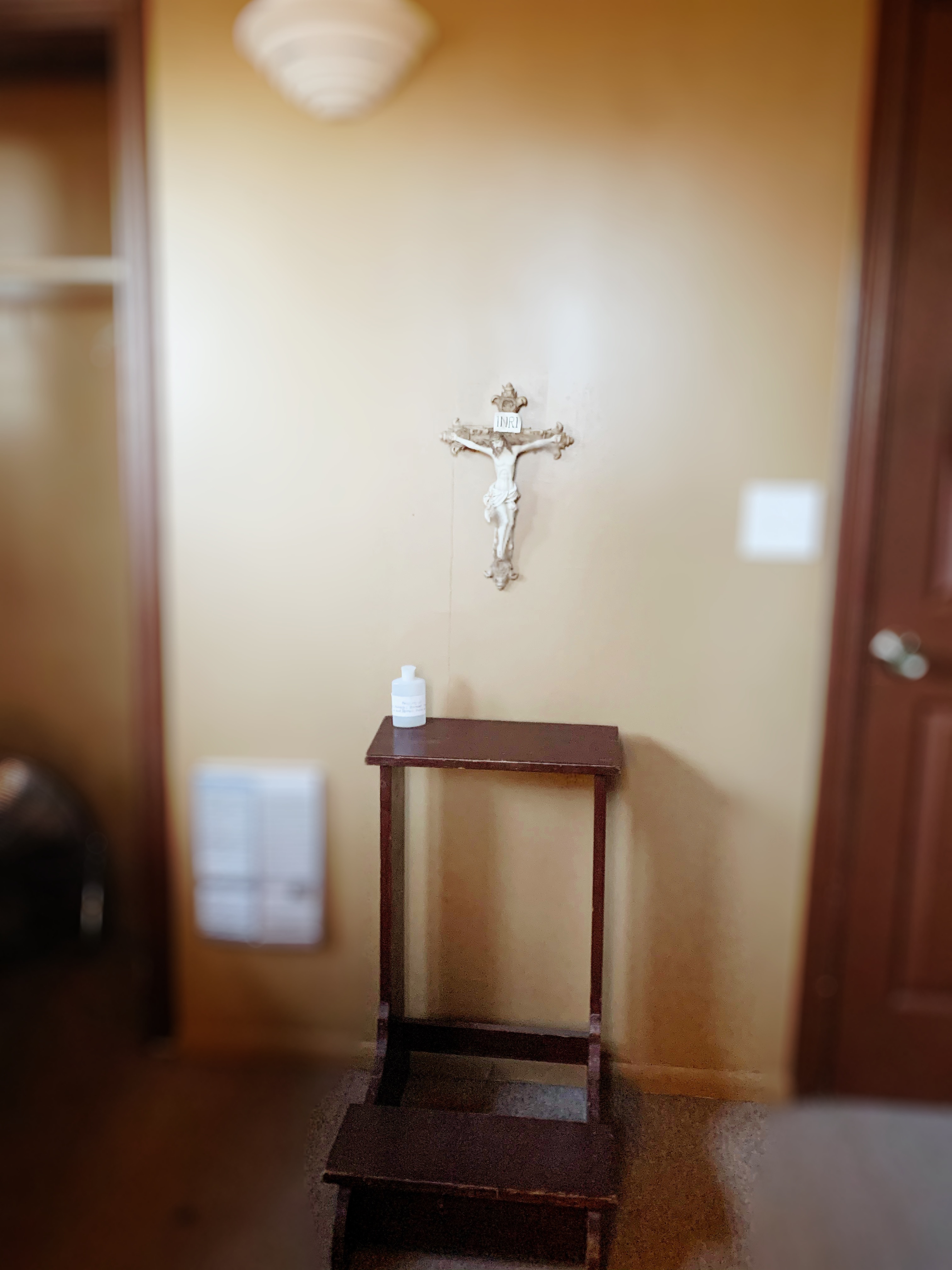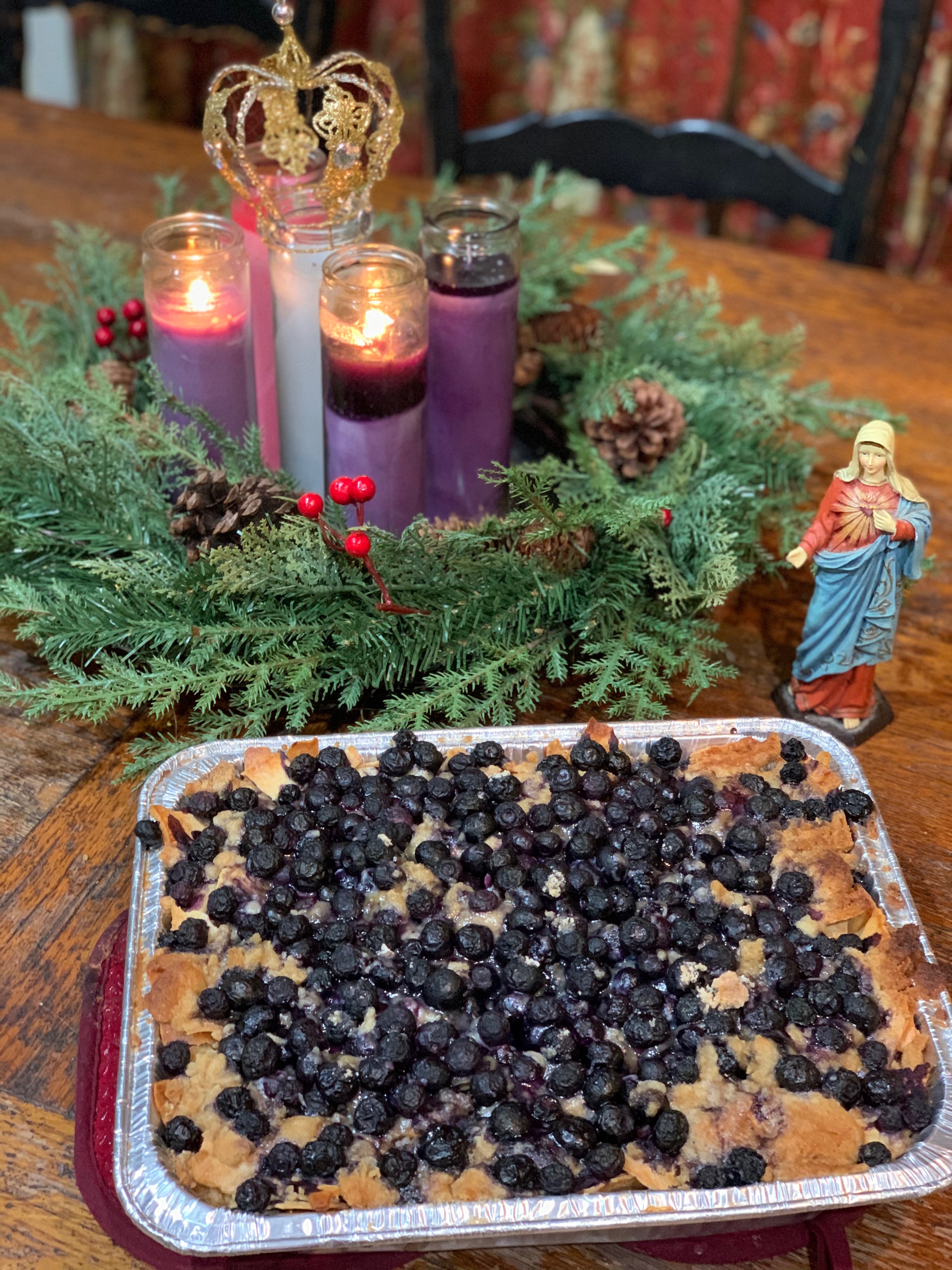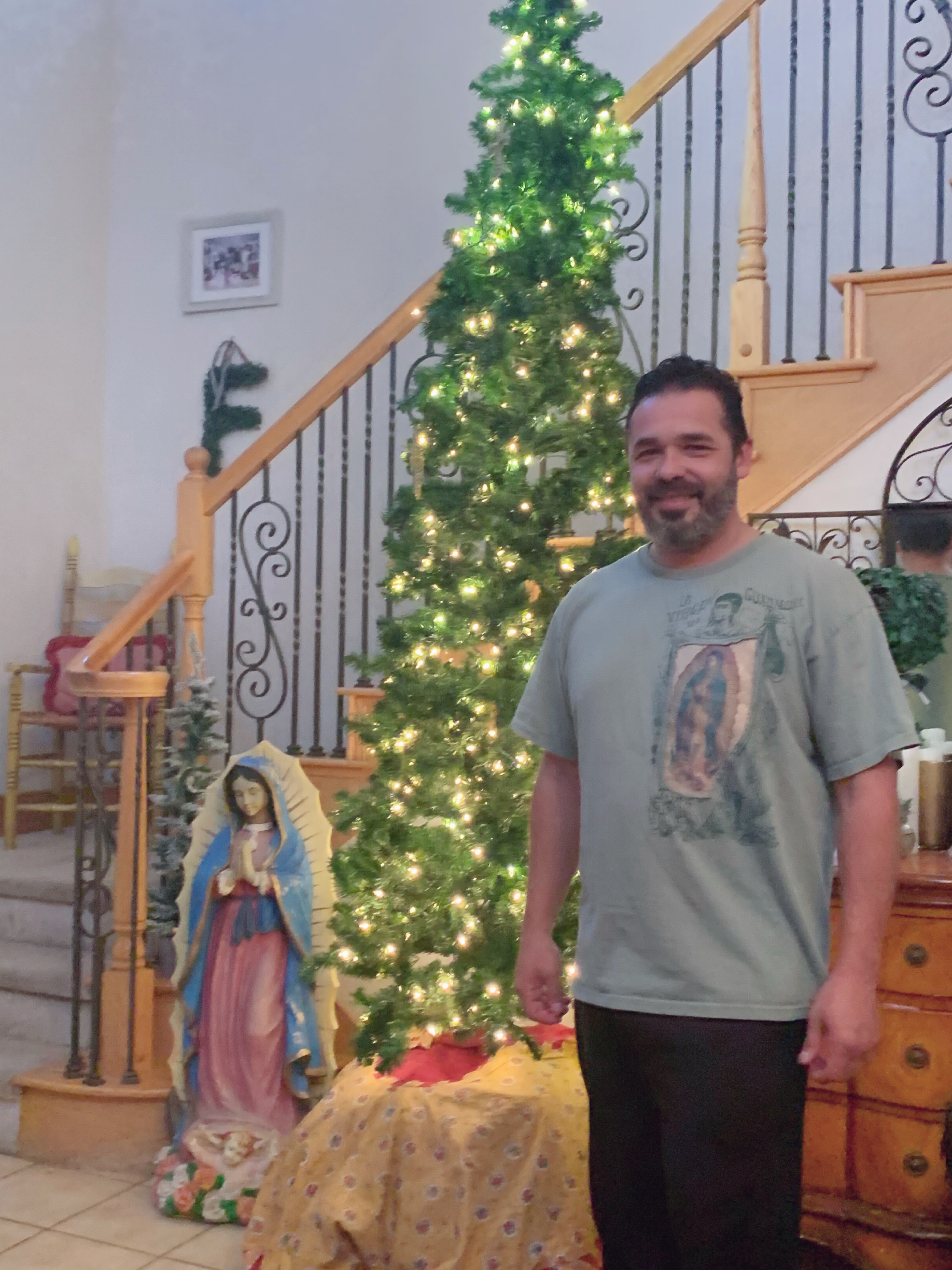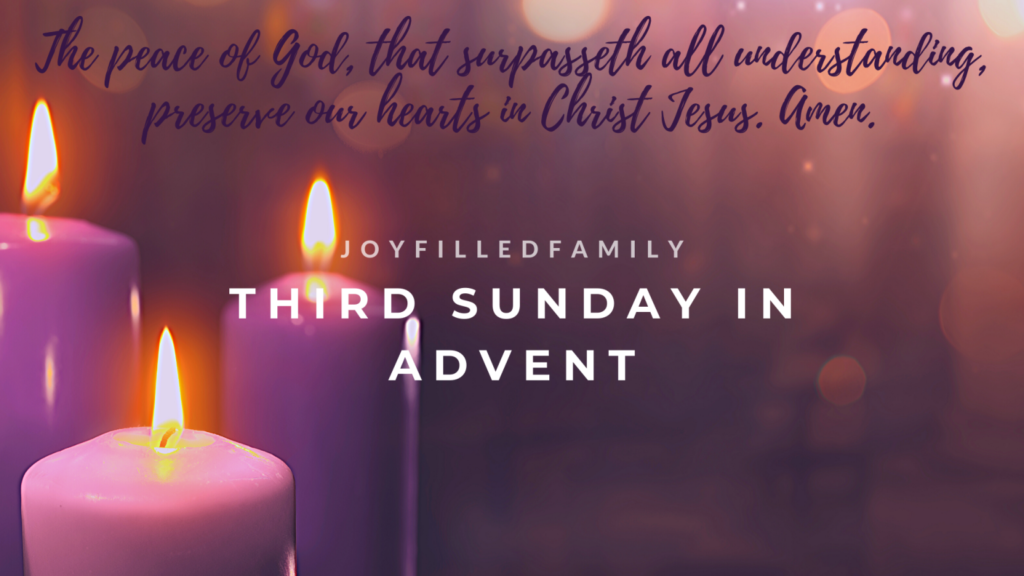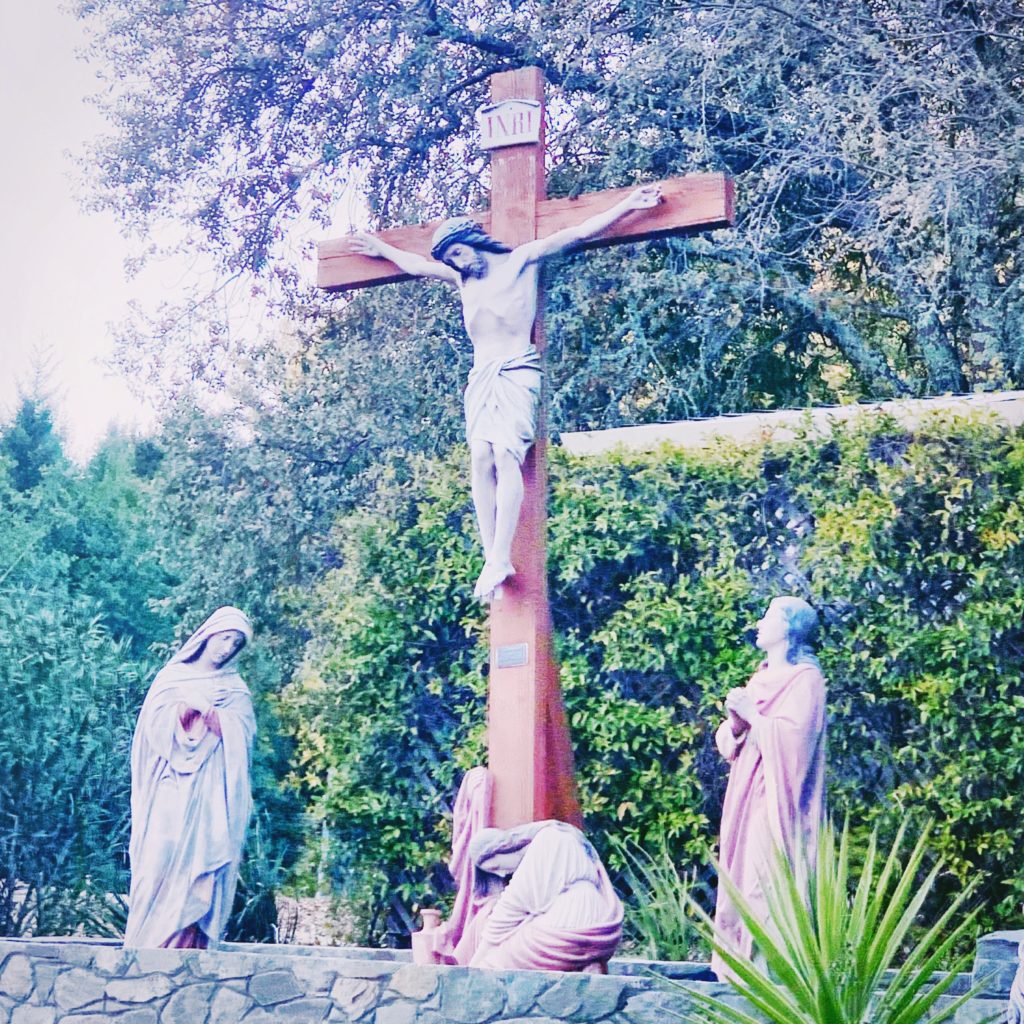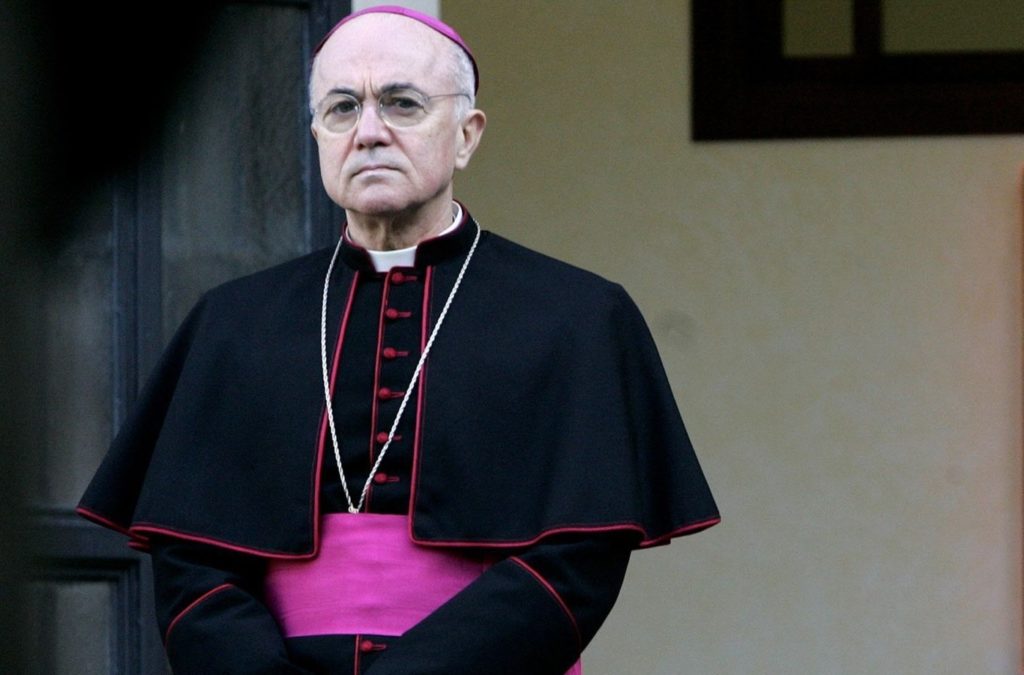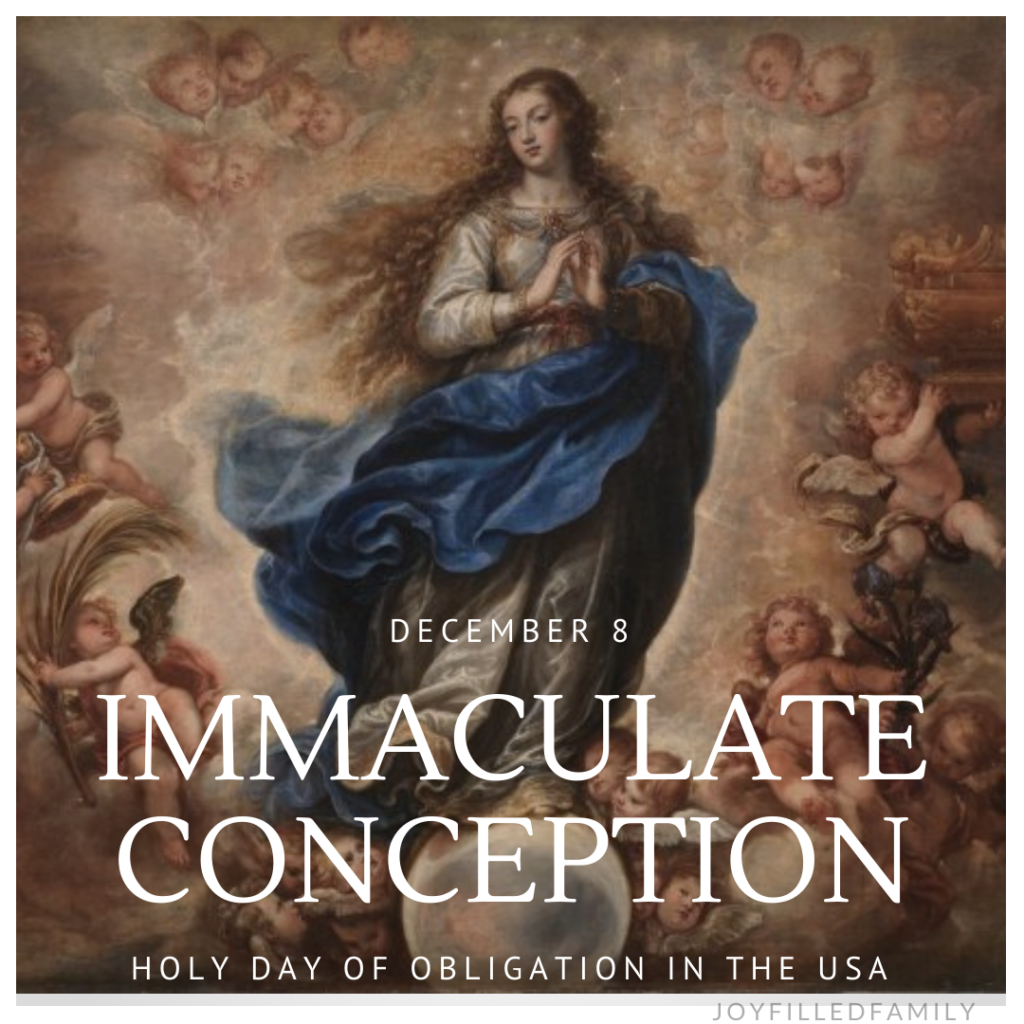“Let us therefore make him a little chamber, and put a little bed in it for him and a table, and a stool, and a candlestick, that when he cometh to us, he may abide there” (IV Kings 4:13). Such was the Sunamite woman’s regard for the prophet Eliseus, that she would make such preparations for his entertainment! Will we do as much for Christ who is ready to come to us? Take pains, O Christian, to occupy this night in pious thoughts, and aspirations, for the love of God and for the good of your own soul, making yourself worthy to receive the graces which He is ready when He comes, to give you. Think how Mary, who was near her time, and Joseph her spouse obedient to the Imperial command, and perfectly submissive to the will of God, journeyed with the greatest inconvenience to Bethlehem, and when, because of the multitude of people, they found no place to receive them they took refuge, as God willed it, in a most miserable stable, at the extreme end of the town. What love does not the Savior deserve, who for love of us so humbled Himself!
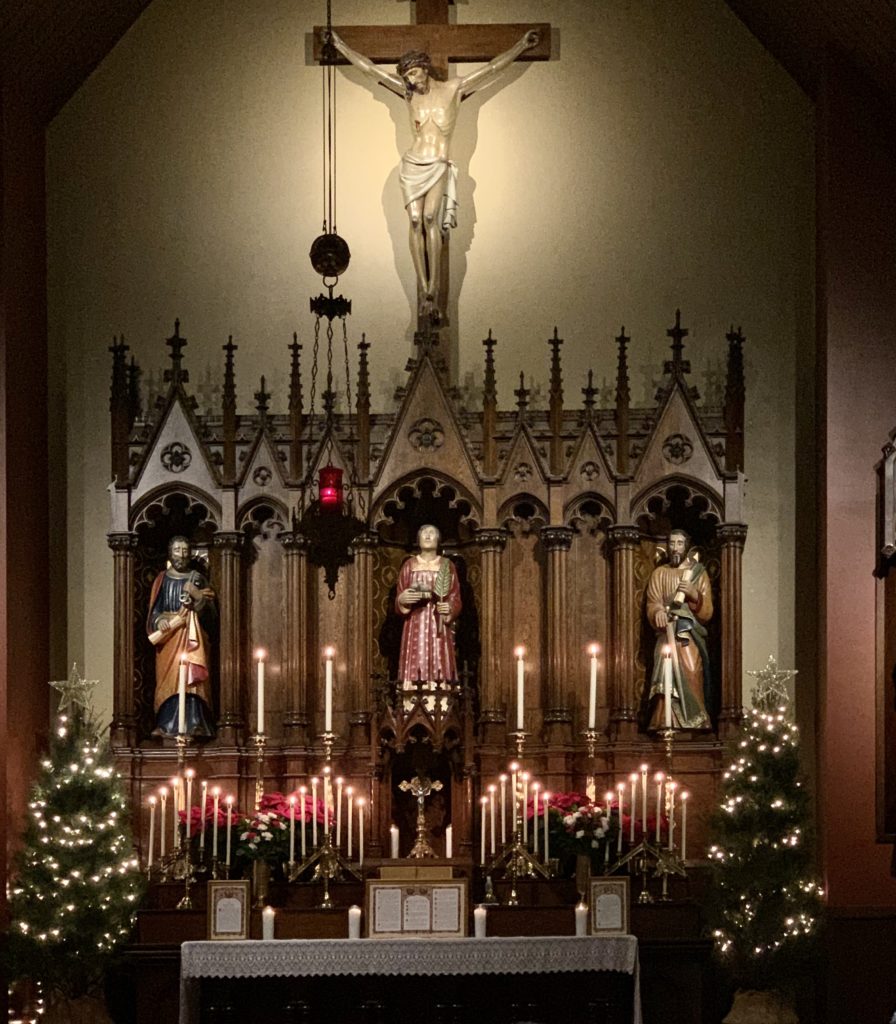
Fr. Goffine’s Instruction
What is Christmas Day?
It is the day on which Christ Jesus, our Redeemer, was born of the Blessed Virgin in a stable at Bethlehem.
Why is this festival called “the Holy Night”?
Because this night has been especially blessed and sanctified by the holy, mysterious birth of the Redeemer of the world.
Why do priests say three Masses on this day?
In commemoration of the threefold birth of the Redeemer: of His birth from all eternity in the bosom of His Heavenly Father; of His birth in the fullness of time; and of His spiritual birth in the hearts of the faithful who, by lively faith in Him, receive the power to become children of God (Jn. 1:12).
Why is the first Mass said at midnight?
Because Christ, the true light which came into the world to enlighten those who sat in darkness and the shadow of death, that is, of unbelief and of sin (Lk. 1:79), was born at night, and because the divine birth is incomprehensible to us.
Why is the next Mass said at daybreak, and the third after sunrise?
To signify that the birth of Christ, expelling the darkness of ignorance and infidelity, brought us the clear daylight of the knowledge of God, and that the spiritual birth of Christ can take place at any time in the pure soul.
When does this spiritual birth take place?
It takes place when the soul, having been cleansed from all sin, makes the firm, unalterable resolution to die to the world and all carnal desires, and arouses in itself the ardent desire henceforth to live only for Christ, and, by His grace, to practice all virtues.
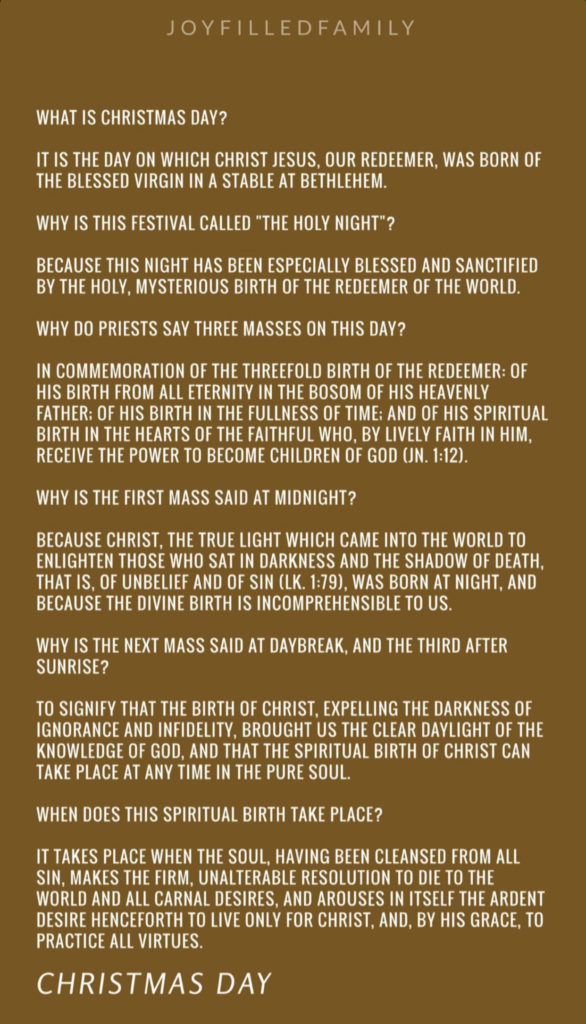
INSTRUCTION ON THE FIRST MASS
The Introit of this Mass reminds us of the eternal birth of Christ, the Lord.
INTROIT The Lord hath said to me: Thou art my Son, this day (that is, from all eternity) have I begotten thee (Ps. 2:7). Why have the Gentiles raged, and the people devised vain things (Ps. 2:1)? Glory be to the Father.
COLLECT O God, who hast made this most sacred night to shine forth with the brightness of the true light: grant, we beseech Thee, that we may enjoy His happiness in heaven, the mystery of whose light we have known upon earth. Through our Lord.
EPISTLE (Tit. 2:11-15). Dearly beloved, the grace of God our Savior hath appeared to all men, instructing us, that denying ungodliness and worldly desires, we should live soberly, and justly, and godly in this world, looking for the blessed hope and coming of the great God and our Savior Jesus Christ, who gave himself for us, that he might redeem us from all iniquity, and might cleanse to himself a people acceptable, a pursuer of good works. These things speak, and exhort, in Christ Jesus our Lord.
In what special manner has the grace and goodness of God been manifested to us?
In the incarnation and birth of Christ, His Son, whom, in His infinite love, He has made like unto us, our brother and our teacher, by whom we have become children of God, and co-heirs of His kingdom.
What does Christ by His incarnation desire to teach us especially?
That we should put aside all unrighteousness, all infidelity and injustice, and endeavor to become like unto Him, who, except in sin, has become altogether like unto us. But especially that we repress the desires of lust, wealth, and honor, and not rest until we have rooted them from our hearts.
How do we live soberly, justly, and godly?
We live soberly, when we fulfill all duties towards ourselves; justly, when we fulfill all duties towards our neighbor; and godly, when we fulfill all duties to God.
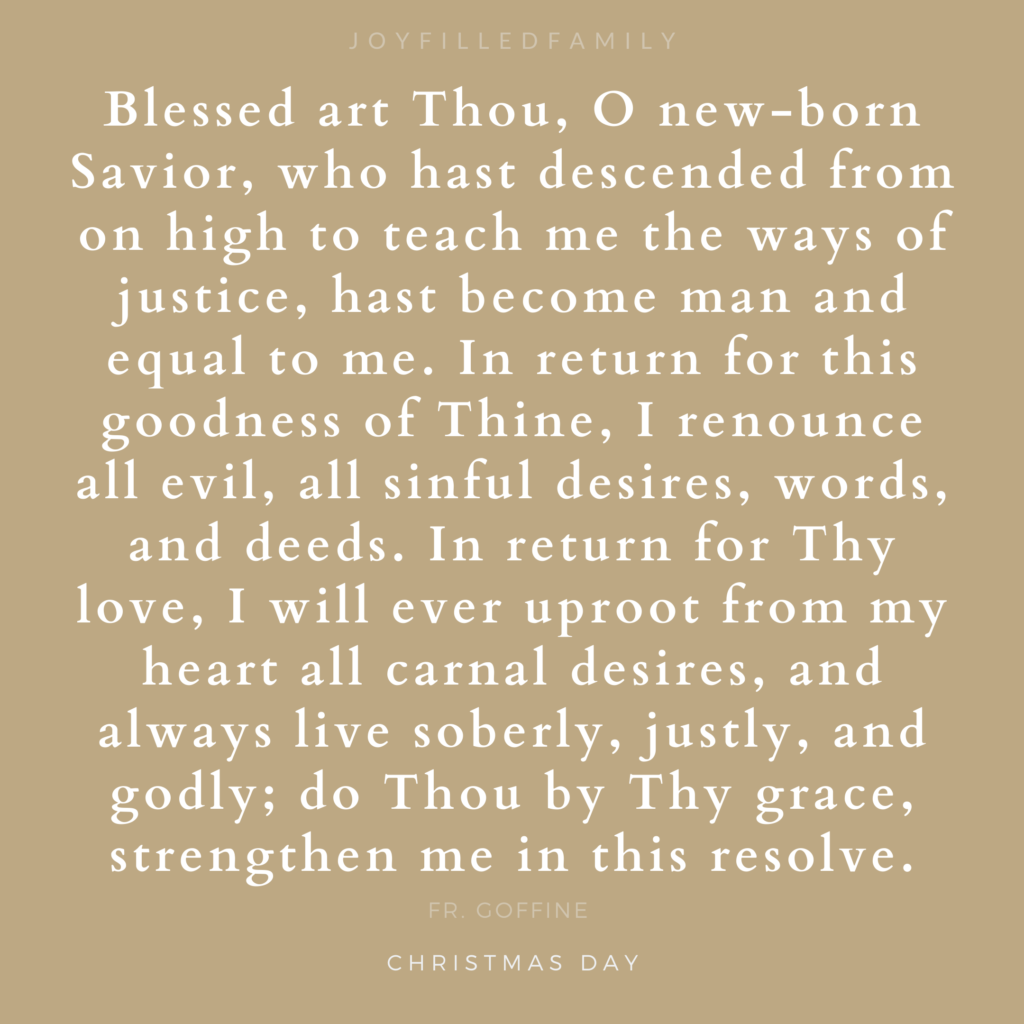
ASPIRATION Blessed art Thou, O new-born Savior, who hast descended from on high to teach me the ways of justice, hast become man and equal to me. In return for this goodness of Thine, I renounce all evil, all sinful desires, words, and deeds. In return for Thy love, I will ever uproot from my heart all carnal desires, and always live soberly, justly, and godly; do Thou by Thy grace, strengthen me in this resolve.
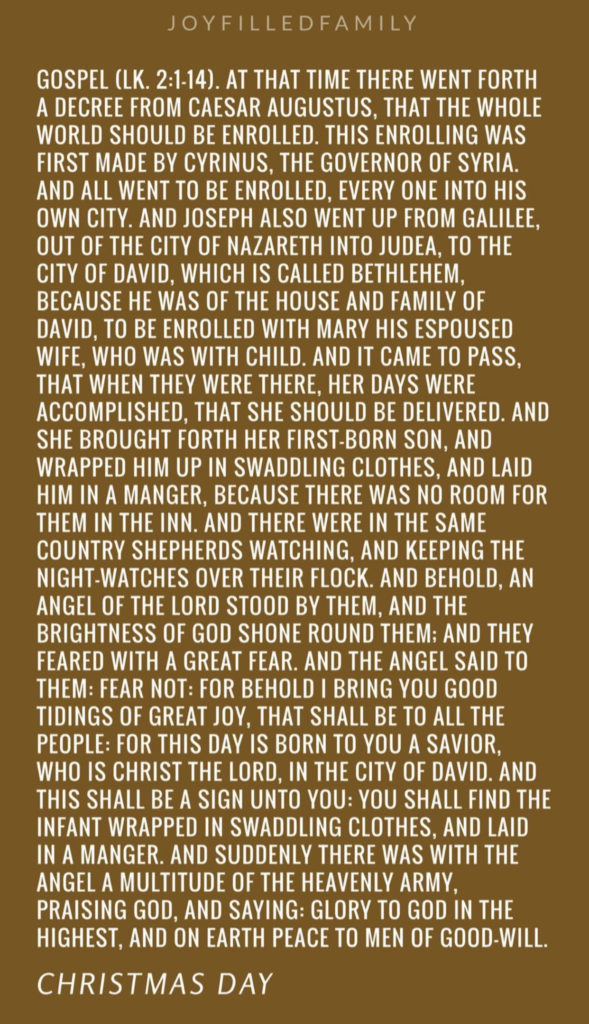
GOSPEL (Lk. 2:1-14). At that time there went forth a decree from Caesar Augustus, that the whole world should be enrolled. This enrolling was first made by Cyrinus, the governor of Syria. And all went to be enrolled, every one into his own city. And Joseph also went up from Galilee, out of the city of Nazareth into Judea, to the city of David, which is called Bethlehem, because he was of the house and family of David, to be enrolled with Mary his espoused wife, who was with child. And it came to pass, that when they were there, her days were accomplished, that she should be delivered. And she brought forth her first-born son, and wrapped him up in swaddling clothes, and laid him in a manger, because there was no room for them in the inn. And there were in the same country shepherds watching, and keeping the night-watches over their flock. And behold, an Angel of the Lord stood by them, and the brightness of God shone round them; and they feared with a great fear. And the Angel said to them: Fear not: for behold I bring you good tidings of great joy, that shall be to all the people: for this day is born to you a Savior, who is Christ the Lord, in the city of David. And this shall be a sign unto you: You shall find the infant wrapped in swaddling clothes, and laid in a manger. And suddenly there was with the Angel a multitude of the heavenly army, praising God, and saying: Glory to God in the highest, and on earth peace to men of good-will.
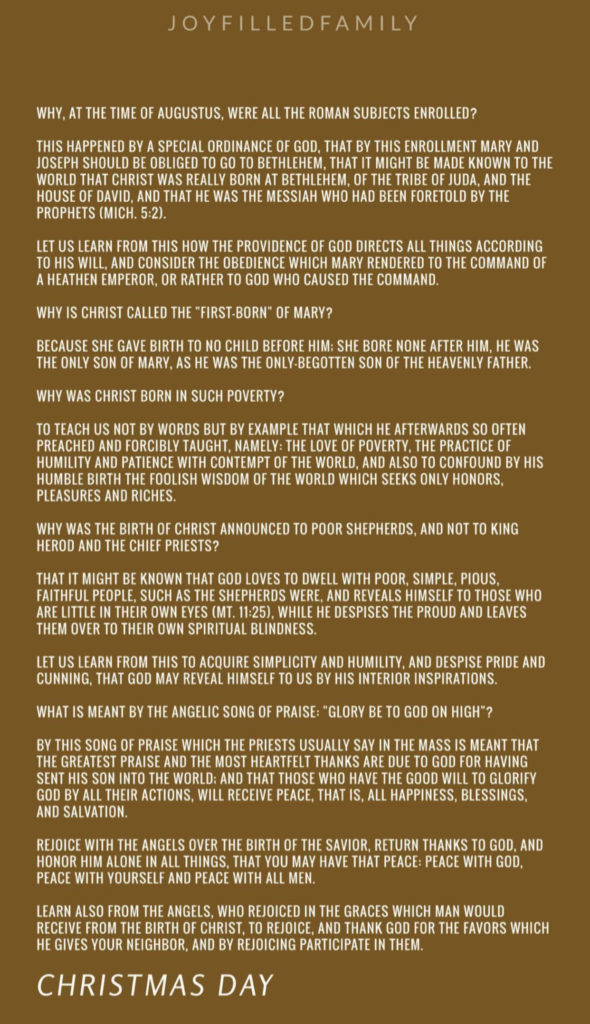
Why, at the time of Augustus, were all the Roman subjects enrolled?
This happened by a special ordinance of God, that by this enrollment Mary and Joseph should be obliged to go to Bethlehem, that it might be made known to the world that Christ was really born at Bethlehem, of the tribe of Juda, and the house of David, and that He was the Messiah who had been foretold by the prophets (Mich. 5:2).
Let us learn from this how the providence of God directs all things according to His will, and consider the obedience which Mary rendered to the command of a heathen emperor, or rather to God who caused the command.
Why is Christ called the “first-born” of Mary?
Because she gave birth to no child before Him; she bore none after Him, He was the only son of Mary, as He was the only-begotten Son of the Heavenly Father.
Why was Christ born in such poverty?
To teach us not by words but by example that which He afterwards so often preached and forcibly taught, namely: the love of poverty, the practice of humility and patience with contempt of the world, and also to confound by His humble birth the foolish wisdom of the world which seeks only honors, pleasures and riches.
Why was the birth of Christ announced to poor shepherds, and not to King Herod and the chief priests?
That it might be known that God loves to dwell with poor, simple, pious, faithful people, such as the shepherds were, and reveals Himself to those who are little in their own eyes (Mt. 11:25), while He despises the proud and leaves them over to their own spiritual blindness.
Let us learn from this to acquire simplicity and humility, and despise pride and cunning, that God may reveal Himself to us by His interior inspirations.
What is meant by the angelic song of praise: “Glory be to God on high”?
By this song of praise which the priests usually say in the Mass is meant that the greatest praise and the most heartfelt thanks are due to God for having sent His Son into the world; and that those who have the good will to glorify God by all their actions, will receive peace, that is, all happiness, blessings, and salvation.
Rejoice with the angels over the birth of the Savior, return thanks to God, and honor Him alone in all things, that you may have that peace: peace with God, peace with yourself and peace with all men.
Learn also from the angels, who rejoiced in the graces which man would receive from the birth of Christ, to rejoice, and thank God for the favors which He gives your neighbor, and by rejoicing participate in them.
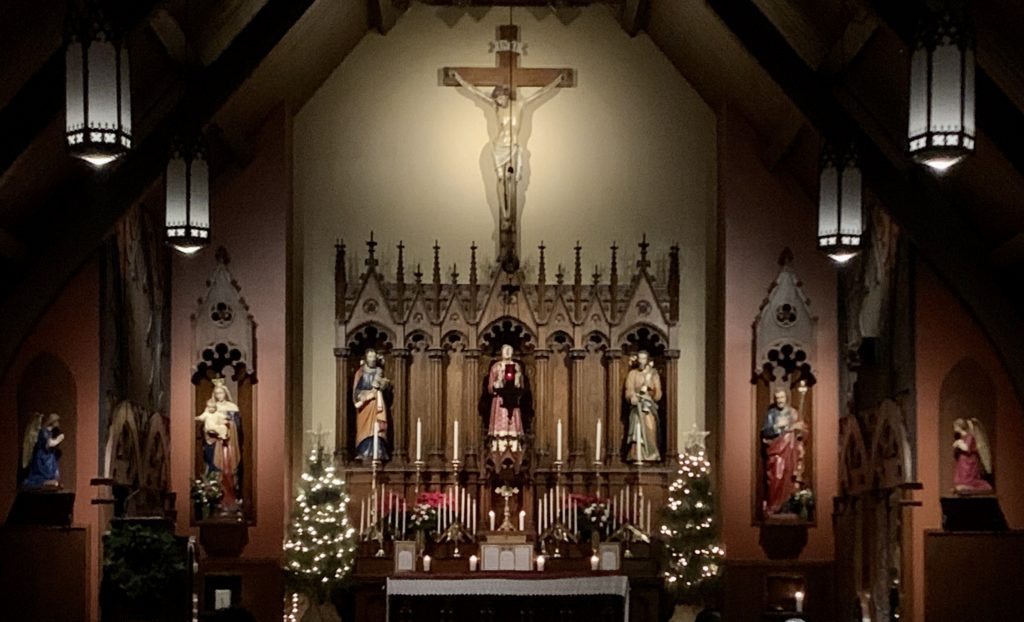
INSTRUCTION ON THE SECOND MASS
In the Introit of this Mass the Church makes use of the words of Isaias:
INTROIT A light shall shine upon us this day: for our Lord is born to us: and he shall be called Wonderful, God, the Prince of peace, the Father of the world to come; of whose reign there shall be no end (Is. 9). The Lord hath reigned, he is clothed with beauty: the Lord is clothed with strength, and hath girded himself. Glory be to the Father.
COLLECT Grant, we beseech Thee, Almighty God, that we, who are filled with the new light of Thy incarnate Word, may show forth in our works what by faith shineth in our minds. Through our Lord.
EPISTLE (Tit. 3:4-7). Dearly beloved, the goodness and kindness of God our Savior hath appeared: not by the works of justice which we have done, but according to his mercy he saved us by the layer of regeneration, and renovation of the Holy Ghost, whom he hath poured forth upon us abundantly through Jesus Christ our Savior: that, being justified by his grace, we may be heirs according to hope of life everlasting, in Christ Jesus our Lord.
To whom do we owe our salvation?
Not to ourselves, nor any good works we may have performed, but entirely to the mercy of God who from all eternity decreed our redemption, and sent His only-begotten Son into this world to accomplish it; which redemption is bestowed upon us in baptism, where we are washed from the stain of sin, and by the rich infusion of the Holy Ghost born again, heirs of eternal life.
Why, then, had God no mercy on the fallen angels?
To this question St. John of Damascus replies: “We must know here that the fall was to the angels what death is to man; for the angels there was no repentance after the fall, as for man there is no repentance after death” (De fid. orthod. lib.2. c.4). In eternity there is no available contrition and penance, so God showed no mercy to the fallen angels. Let us learn from this, to make ourselves participators in the mercy of God, by contrition and penance while there is yet time.
GOSPEL (Lk. 2:15-20). At that time the shepherds said one to another: Let us go over to Bethlehem, and let us see this word that is come to pass, which the Lord hath showed to us. And they came with haste; and they found Mary and Joseph, and the infant lying in a manger. And seeing they understood of the word that had been spoken to them concerning this child. And all that heard wondered, and at those things that were told them by the shepherds. But Mary kept all these words, pondering them in her heart. And the shepherds returned, glorifying and praising God, for all the things they had heard and seen, as it was told unto them.
INSTRUCTION
I. The shepherds follow at once the voice of God which calls them to the manger; they exhort one another to do so; they seek the Redeemer and happily find Him; they make Him known to others, and heartily thank God for the grace given them.
Let us follow the inspirations of God with ready obedience; let us exhort one another to virtue by our good example and edifying conversation; let us make good use of the knowledge given us by God, give it to others, and praise God for the same.
II. Mary kept all these words, spoken about her Son, and pondered them in her heart. Let us learn from her to prepare food for our souls by careful meditation on the divine truths that are made known to us: so that we may be preserved and strengthened in spiritual life.
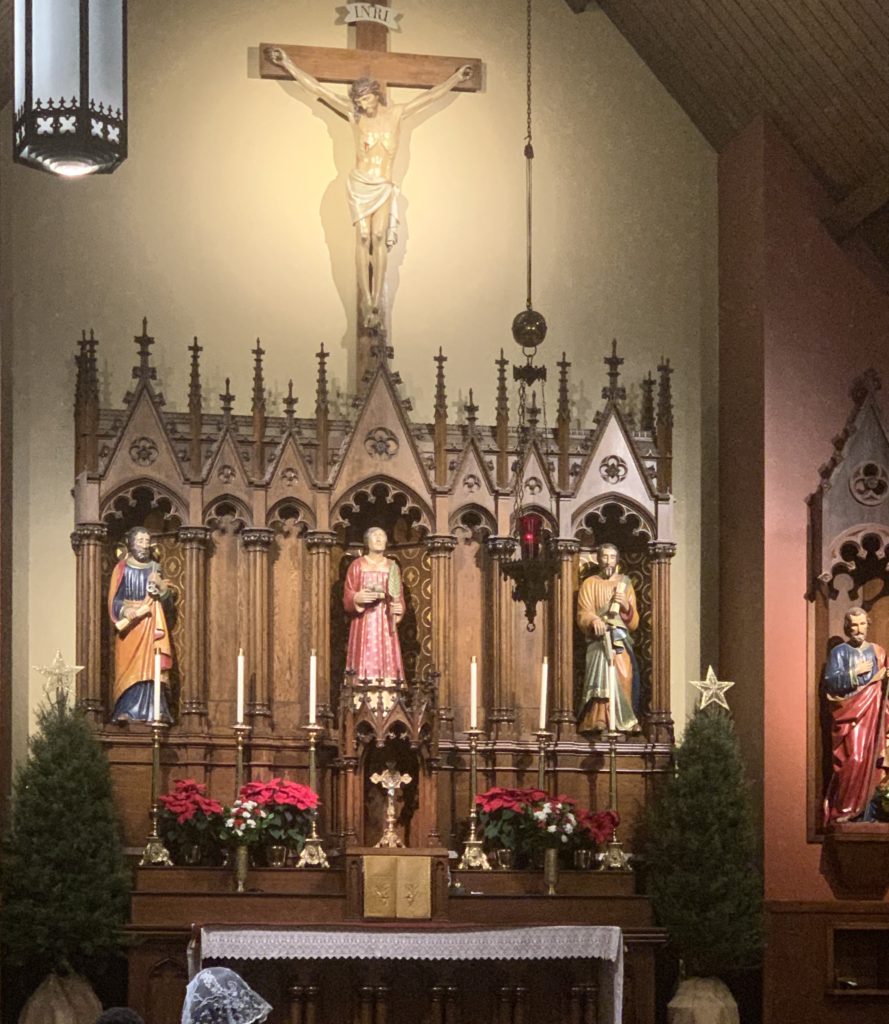
INSTRUCTION ON THE THIRD MASS
The Introit of this Mass reminds us of the spiritual birth of Christ, by which He is spiritually born in us:
INTROIT A child is born to us, and a Son is given to us; whose government is upon his shoulder; and his name shall be called the Angel of great counsel (Is. 9). Sing ye to the Lord a new canticle: for he bath done wonderful things (Ps. 97). Glory be to the Father.
COLLECT Grant, we beseech Thee, Almighty God, that the new birth of Thine only-begotten Son in the flesh may deliver us who are held by the old bondage under the yoke of sin. Through our Lord.
EPISTLE (Heb. 1:1-12). God, who diversely and many ways, spoke in times past to the fathers by the prophets, last of all, in these days hath spoken to us by his Son, whom he hath appointed heir of all things, by whom also he made the world. Who being the brightness of his glory, and the figure of his substance, and upholding all things by the word of his power, making purgation of sins, sitteth on the right hand of the majesty on high: being made so much better than the angels, as he hath inherited a more excellent name than they. For to which of the angels hath he said at any time: Thou art my son, today have I begotten thee? And again, I will be to him a father, and he shall be to me a son? And again when he bringeth in the first-begotten into the world, he saith: And let all the angels of God adore him. And to the angels indeed he saith: He that maketh his angels spirits, and his ministers a flame of fire. But to the Son: Thy throne, O God, is for ever and ever: a scepter of justice is the scepter of thy kingdom. Thou hast loved justice, and hated iniquity: therefore, God, thy God, hath anointed thee with the oil of gladness above thy fellows. And: Thou in the beginning, O Lord, didst found the earth; and the works of thy hands are the heavens. They shall perish, but thou shalt continue; and they shall all grow old as a garment, and as a vesture shalt thou change them, and they shall be changed; but thou art the self-same, and thy years shall not fail.
INSTRUCTION The greatness of Christ Jesus, the dignity of His divinity and humanity, the love and goodness of His Heavenly Father, who has given Him to us as our teacher, could not be more gloriously described than in this epistle. Learn from it how much you are obliged, because of this, to serve God, to be grateful to Him, and to follow Christ who governs heaven and earth; and whom the angels serve.
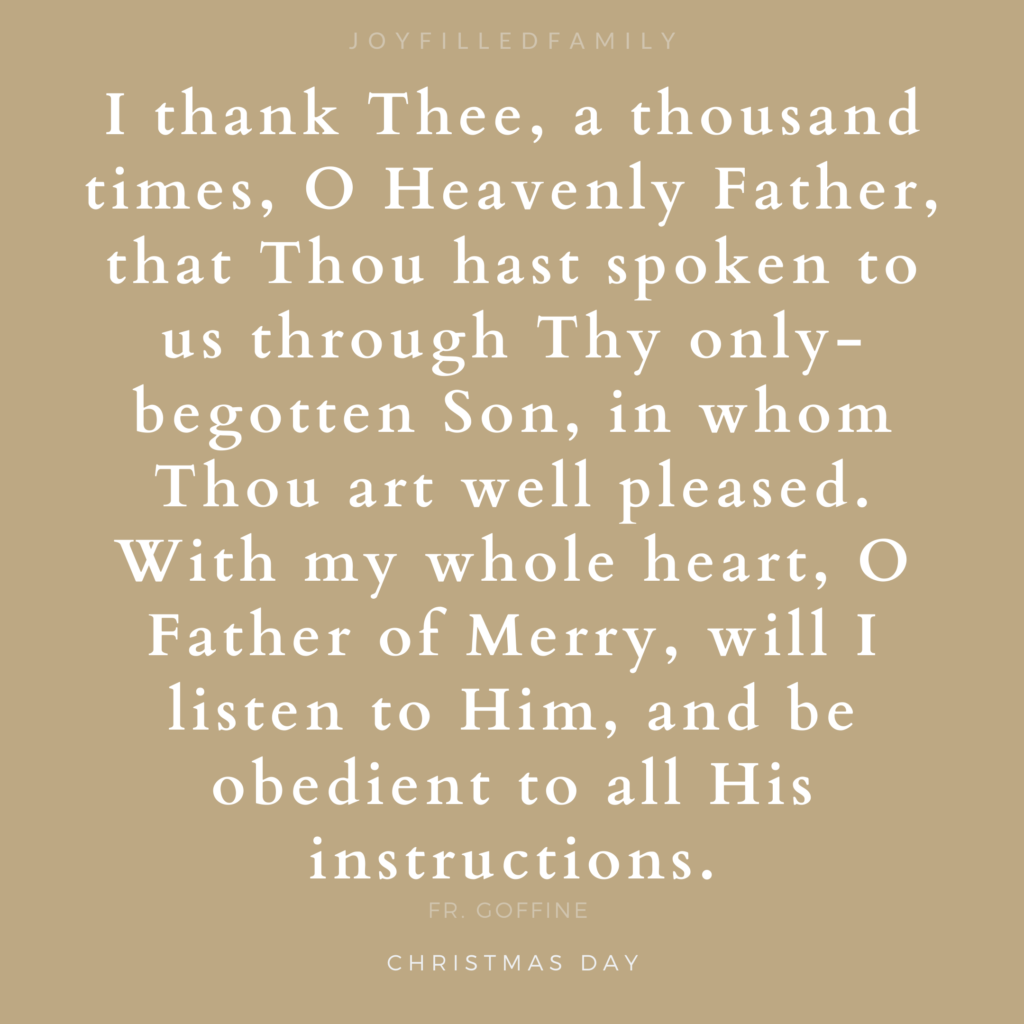
ASPIRATION I thank Thee, a thousand times, O Heavenly Father, that Thou hast spoken to us through Thy only-begotten Son, in whom Thou art well pleased. With my whole heart, O Father of Merry, will I listen to Him, and be obedient to all His instructions.
GOSPEL (Jn. l:1-14). In the beginning was the Word, and the Word was with God, and the Word was God. The same was in the beginning with God. All things were made by him, and without him was made nothing that was made. In him was life, and the life was the light of men; and the light shineth in darkness, and the darkness did not comprehend it. There was a man sent from God whose name was John. This man came for a witness, to bear witness of the light, that all men might believe through him. He was not the light, but was to bear witness of the light. That was the true light, which enlighteneth every man that cometh into this world. He was in the world, and the world was made by him, and the world knew him not. He came unto his own, and his own received him not. But as many as received him, to them he gave power to be made the sons of God, to them that believe in his name. Who are born, not of blood, nor of the will of the flesh, nor of the will of man, but of God. And the Word was made flesh, and dwelt among us (and we saw his glory, the glory as of the only-begotten of the Father), full of grace and truth.
What does St. John mean by the Word?
That the Son of God, who was begotten and brought forth like a word of the mouth from the Father, but in a manner incomprehensible and inscrutable to us, is one with the Father in the divine nature, but different from Him in person; He is also called the Word of the Father, because through Him the Father has spoken and made known the divine will (Heb. 1:2; Mt. 17:5).
What is meet by- In the beginning was the Word, and the Word was with God?
When all things had their beginning the Son of God already was, not made or created, but born of the Father from eternity, with whom and in whom He therefore existed from all eternity. St. John here teaches the divinity, the eternity, and the equality of Christ with the Father.
What is meantt by: All things were made by Him?
That the Son of God, Himself true God, with the Father and the Holy Ghost, has made all things, visible and invisible.
What is meant by: In Him was the life?
It means: The Son of God is the origin and fountain of the spiritual life of our souls upon earth, and of the glorious life in eternity. To give this true life to us, He became man, whereby we are born again, newly created, as it were, from the death of sin to the life of grace and righteousness.
Why is this life the light of men?
Because this true life of the soul which Christ has obtained for us, consists in the ever increasing knowledge of God and his salvation, which knowledge also comes from Christ, either externally through holy words and examples, or inwardly by divine inspiration.
How did the light shine in darkness?
The Son of God has given the necessary grace to find the true faith to mankind. He still imparts to all men the necessary light, especially by His holy Word which is preached to them, but the hardened sinners reject it, because they wish not to hear of faith and repentance.
How did St. John the Baptist bear witness of the light?
By announcing the Savior to the world, and even pointing Him out when He appeared.
Who receive Christ?
Those who walk in the light of His grace, co-operate with it, and so become the children of God.
How are we to understand: The Word was made flesh?
We are to understand by it that the Word was not changed into human nature, but that He became incarnate by the Holy Ghost of the Virgin Mary, and was made man, thus uniting in Himself two natures, the divine and the human. So Christ is true God, and at the same time true man, therefore God-Man; consequently there are in Christ two wills, the divine and the human. In His humanity He is less than the Father (Jn. 14:28), in His divinity He is equal to the Father On. 10:30); His humanity filled Him with a natural terror of His sufferings, but His divinity was perfectly united with the will of His Heavenly Father, and could pray: Not my will, but thine be done.
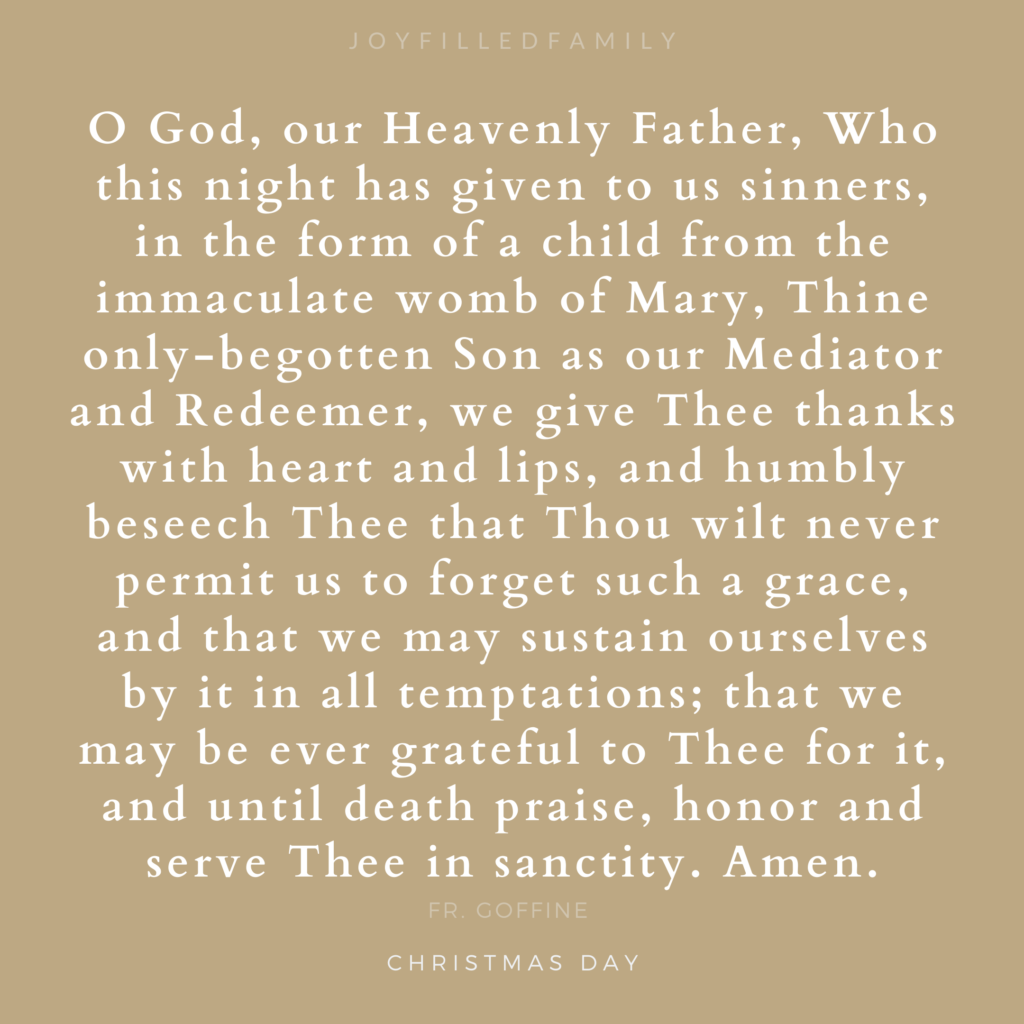
ASPIRATION O God, our Heavenly Father, Who this night has given to us sinners, in the form of a child from the immaculate womb of Mary, Thine only-begotten Son as our Mediator and Redeemer, we give Thee thanks with heart and lips, and humbly beseech Thee that Thou wilt never permit us to forget such a grace, and that we may sustain ourselves by it in all temptations; that we may be ever grateful to Thee for it, and until death praise, honor and serve Thee in sanctity. Amen.
Whence comes the custom of representing in our churches and houses the crib of Bethlehem?
This custom was introduced by St. Francis of Assisi who, having a particular devotion to the Infant Jesus, was accustomed to represent to himself in this way the stable and manger at Bethlehem the further to excite his love; and as this pious practice is calculated to assist exceedingly in the instruction of the unlearned, especially of children, it was introduced into many congregations.
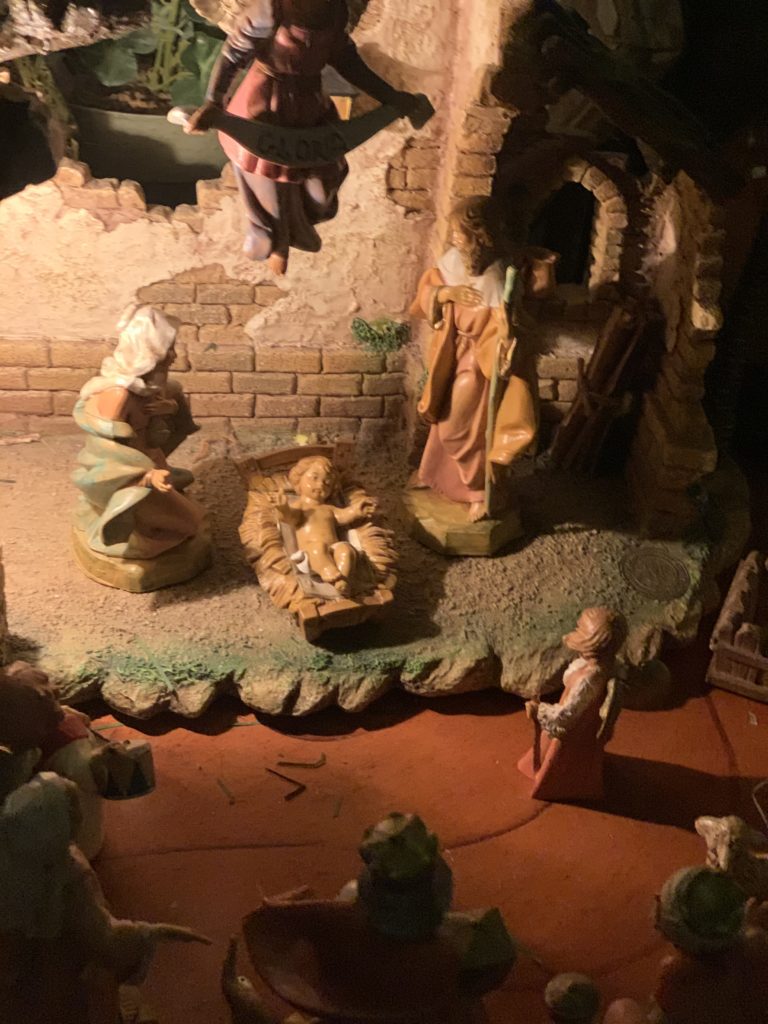
THE SOCIETY OF THE HOLY CHILDHOOD FOR THE SALVATION OF HEATHEN CHILDREN
Many thousands of heathen children die every year without baptism, and what is most terrible, a great number of these unfortunate children die the most miserable death, and thus perish, soul and body. In the heathen countries, especially in China, a country that contains more than three hundred million inhabitants, it is the horrible custom of parents, when they have too many children, or when they are sickly, weak, or deformed to expose them on the streets, or to throw them with a weight around their neck into the water. On the streets the poor little children die of hunger, or are devoured by beasts, in the water their flesh becomes the food of fishes. Many, especially girls, are picked up by the wicked heathens, carried home, and so trained that when they grow up, they may enrich their masters by prostitution. A multitude of others are strangled immediately after birth, their bodies thrown into the water, or into the gutter. No law forbids or punishes this horrible custom. No less than twenty or thirty thousand of these unfortunate children are killed in one year.
The missionaries who preach the gospel to these heathens witnessed these cruelties with terror without being able to do anything to abolish this awful custom. To see these children die without baptism grieved them. Some sought to gather, baptize and raise them. Good women were engaged for this purpose. But how could the missionaries provide for so many, how support those women who collected these unfortunate children? They had no means. Necessary compelled them to turn to Christian Europe. By touching letters they solicited alms for these little unfortunates. Owing to the sad condition of these children the pious bishop of Nancy, Forbin Janson, became the founder of the Society of the Holy Child Jesus, inviting all children of his diocese to form a Society of the Holy Childhood, under the patronage of the Blessed Virgin Mary, for the benefit of the miserable heathen children, giving alms out of love for the Infant Savior. All under twenty-one years of age, were to belong to it forming clubs of twelve, in honor of the twelve years of Christ’s childhood; each member to contribute one cent monthly; and to say one Hail Mary every day with the invocation: “Holy Mary, pray for us and for the poor children of the heathens.” By means of the money thus collected, the missionaries were enabled to save the heathen children from spiritual and corporal death. The society has been in existence since 1841, and has already embraced all Catholic countries; thousands of pious Christian children deprive themselves of a portion of their food in order to save alms, thereby performing a good work for the love of the child Jesus and the salvation of the children of the heathens. Adults are admitted as honorary members, and would it not be well, beloved reader, for you to join it, and by prayers and alms aid in saving those little ones? This would be indeed a good work, for which rich reward will be given in heaven.
